Table of Contents
Chapter 8
Instituting the Association's Four-fold Program in Prison Camps: From Saving the POW's Soul to "Keeping Body and Soul Together"
1
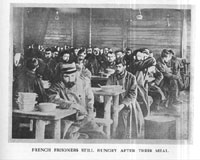 The Association program that Archibald C. Harte introduced and expanded in German prison camps was based on the "Four-fold" Program
developed by the American YMCA before the war. The Association sought to improve young men, concentrating on the development of social,
educational, religious, and physical skills to promote sound minds and bodies. The organization's inverted Red Triangle symbol reflected
the three principles of the YMCA's welfare objectives: development of the body, mind, and spirit (the inverted triangle was supported by
invisible hands, which indicated the Christian basis of the organization rather than depicting a standard triangle standing firmly on the
ground).
The Association program that Archibald C. Harte introduced and expanded in German prison camps was based on the "Four-fold" Program
developed by the American YMCA before the war. The Association sought to improve young men, concentrating on the development of social,
educational, religious, and physical skills to promote sound minds and bodies. The organization's inverted Red Triangle symbol reflected
the three principles of the YMCA's welfare objectives: development of the body, mind, and spirit (the inverted triangle was supported by
invisible hands, which indicated the Christian basis of the organization rather than depicting a standard triangle standing firmly on the
ground).
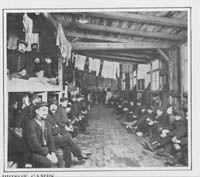 American and neutral WPA field secretaries established social and welfare services for war prisoners that reflected various dimensions
of the Association's program. By the third year of the war, secretaries recognized the problems of troops who lived under military orders
twenty-four hours a day. Soldiers had no privacy in their barracks or tents, and they were removed from ordinary life. Troops in the field
did, however, receive regular passes, furloughs, and visits from time to time. These luxuries were not available to war prisoners. The POW
was surrounded by barbed-wire stockades, and rare walks took prisoners into hostile country. Correspondence was strictly limited and
controlled by censors. There was no privacy inside the prison camps, and POWs faced the possibility of starvation or insanity. Rather than
allowing POWs to wallow in self-pity and idleness, the YMCA saw incarceration as an opportunity for these men to improve themselves and to
leave the camps as better men for the experience.1
American and neutral WPA field secretaries established social and welfare services for war prisoners that reflected various dimensions
of the Association's program. By the third year of the war, secretaries recognized the problems of troops who lived under military orders
twenty-four hours a day. Soldiers had no privacy in their barracks or tents, and they were removed from ordinary life. Troops in the field
did, however, receive regular passes, furloughs, and visits from time to time. These luxuries were not available to war prisoners. The POW
was surrounded by barbed-wire stockades, and rare walks took prisoners into hostile country. Correspondence was strictly limited and
controlled by censors. There was no privacy inside the prison camps, and POWs faced the possibility of starvation or insanity. Rather than
allowing POWs to wallow in self-pity and idleness, the YMCA saw incarceration as an opportunity for these men to improve themselves and to
leave the camps as better men for the experience.1
Educational Programs
2
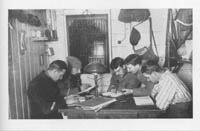 One of the best means to combat boredom in prison camps was the prison camp library. Not only did books provide light entertainment to
divert POWs' minds from their incarceration, but prisoners could also continue their studies or expand their skills through academic
and professional texts. The American YMCA, the German YMCA, and the World's Alliance of YMCAs focused their resources on obtaining books
for prison camp libraries. Several problems were associated with book acquisition. The supply of books in Slavic tongues was extremely
limited for Central Power POWs in Allied prison camps. For Allied prisoners in German prison camps, however, there does not appear to
have been as great a shortage of books in their native tongues. While books in Russian, Indian dialects, and Arabic may have been in short supply,
the level of literacy of prisoners from areas where these languages were spoken was often relatively low, and thus the demand for books
was limited.2
One of the best means to combat boredom in prison camps was the prison camp library. Not only did books provide light entertainment to
divert POWs' minds from their incarceration, but prisoners could also continue their studies or expand their skills through academic
and professional texts. The American YMCA, the German YMCA, and the World's Alliance of YMCAs focused their resources on obtaining books
for prison camp libraries. Several problems were associated with book acquisition. The supply of books in Slavic tongues was extremely
limited for Central Power POWs in Allied prison camps. For Allied prisoners in German prison camps, however, there does not appear to
have been as great a shortage of books in their native tongues. While books in Russian, Indian dialects, and Arabic may have been in short supply,
the level of literacy of prisoners from areas where these languages were spoken was often relatively low, and thus the demand for books
was limited.2
3
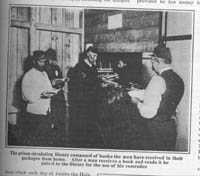 The greatest challenge to American secretaries attempting to purchase books for prison camp libraries was meeting German censorship
requirements. The censors passed only pre-war books that did not address politically sensitive issues. Working through the German
legation in Bern, the Association established an extensive book exchange system for POWs.
The greatest challenge to American secretaries attempting to purchase books for prison camp libraries was meeting German censorship
requirements. The censors passed only pre-war books that did not address politically sensitive issues. Working through the German
legation in Bern, the Association established an extensive book exchange system for POWs.
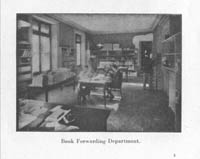 Books for French prisoners in Germany were collected in France, and books for German POWs in France were obtained in Germany and passed
through Switzerland. The German government provided a considerable sum of money for this exchange program, and the YMCA distributed the
French books in Germany. Student prisoners in German POW camps checked off the books they desired from an approved list of textbooks,
and the American YMCA provided these texts. The success of this program led to the establishment of similar exchange programs in Britain
and Russia with Germany.3
Books for French prisoners in Germany were collected in France, and books for German POWs in France were obtained in Germany and passed
through Switzerland. The German government provided a considerable sum of money for this exchange program, and the YMCA distributed the
French books in Germany. Student prisoners in German POW camps checked off the books they desired from an approved list of textbooks,
and the American YMCA provided these texts. The success of this program led to the establishment of similar exchange programs in Britain
and Russia with Germany.3
4
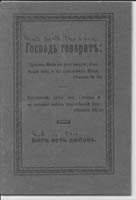 The American YMCA had the most difficult time obtaining books in Russian for POWs in Germany. During the early part of the war, there
was an acute shortage of these books. By September 1916, however, the Association was able to supply a total of 306,000 Russian texts
and Scriptures directly to Russian prisoners. The YMCA also provided 56,700 Russian books to prison camp and hospital libraries. The
most direct approach to solving the book shortage was for the Association to print Russian texts.
The American YMCA had the most difficult time obtaining books in Russian for POWs in Germany. During the early part of the war, there
was an acute shortage of these books. By September 1916, however, the Association was able to supply a total of 306,000 Russian texts
and Scriptures directly to Russian prisoners. The YMCA also provided 56,700 Russian books to prison camp and hospital libraries. The
most direct approach to solving the book shortage was for the Association to print Russian texts.
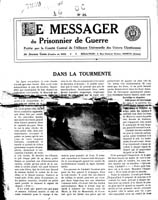 In 1916, the German YMCA began publishing elementary Russian textbooks, while the American YMCA set up a Russian publishing firm in
Bern, Switzerland. The shortage was further relieved by a shipment of 110 small libraries by Princess Helen of Altenburg from Russia
as her personal contribution to Russian war prisoners.4 The American YMCA also
scoured German bookstores for works in a wide range of Allied tongues. Between 1 August and 1 October 1917, the WPA Headquarters in
Berlin shipped out 96,914 books in seventeen different languages, including Tartar, Turkish, Flemish, Finnish, Estonian, English,
French, Russian, Romanian, Serbian, and Armenian. In addition, the World's Committee published a monthly magazine, The Messenger
to the Prisoners of War, specifically for war prisoners.
In 1916, the German YMCA began publishing elementary Russian textbooks, while the American YMCA set up a Russian publishing firm in
Bern, Switzerland. The shortage was further relieved by a shipment of 110 small libraries by Princess Helen of Altenburg from Russia
as her personal contribution to Russian war prisoners.4 The American YMCA also
scoured German bookstores for works in a wide range of Allied tongues. Between 1 August and 1 October 1917, the WPA Headquarters in
Berlin shipped out 96,914 books in seventeen different languages, including Tartar, Turkish, Flemish, Finnish, Estonian, English,
French, Russian, Romanian, Serbian, and Armenian. In addition, the World's Committee published a monthly magazine, The Messenger
to the Prisoners of War, specifically for war prisoners.
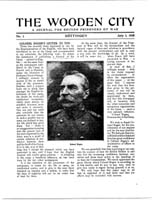 The World's Alliance published editions in English, French, Russian, and Italian, and these journals were freely distributed in German
prison camps. The YMCA also helped support prison camp newspapers in many POW camps, including The Wooden City: A Journal for British
Prisoners of War in Göttingen; Le Camp de Göttingen: Les Manuscripts non inseres ne sont pas rendus, also in
Göttingen; The Barbed Wireless in Rastatt; The Rembahn Review in Münster II; The Döberitz Empire in
Döberitz; and In Ruhleben Camp in Ruhleben. These newspapers gave prisoners a chance to liven up social life in the stockades, spread some
gossip, and improve morale.5
The World's Alliance published editions in English, French, Russian, and Italian, and these journals were freely distributed in German
prison camps. The YMCA also helped support prison camp newspapers in many POW camps, including The Wooden City: A Journal for British
Prisoners of War in Göttingen; Le Camp de Göttingen: Les Manuscripts non inseres ne sont pas rendus, also in
Göttingen; The Barbed Wireless in Rastatt; The Rembahn Review in Münster II; The Döberitz Empire in
Döberitz; and In Ruhleben Camp in Ruhleben. These newspapers gave prisoners a chance to liven up social life in the stockades, spread some
gossip, and improve morale.5
5
 The Deutsche Christlicher Studentenvereinigungen (German Christian Student Union or DCSV) also played an important role in the POW book exchange program. The initial
concern of Dr. Gerhard Niedermeyer and other Student Christian leaders was the welfare of German academics imprisoned in Russia. They
provided these POWs with scholarly textbooks as Liebesgaben (charitable gifts) and Harte developed an exchange system with the
Russian government. In the meantime, the DCSV began to collect and distribute professional literature for French, Russian, and English
POWs in German prison camps. The Ministry of War approved this plan, which allowed students to continue their studies. The DCSV
systematically set up libraries of technical books in several prison camps. The DCSV also collected German professional texts for German
POWs in Allied prison camps, and was soon sending large consignments of books to prisoners in France and England. In conjunction with the
American YMCA, the DCSV drew up wish-lists, which allowed academics to request special books required for their studies and research. The
DCSV estimated that their program assisted approximately twenty thousand academics in continuing their research during their incarceration. By the
spring of 1916, the American YMCA had received permission from the Russian government for the DCSV to prepare libraries for German POWs
in European Russia and Siberia. The DCSV immediately sent three hundred libraries containing three hundred volumes in each set to Russia for use by students
in POW camps. Thousands of books were to follow this initial shipment. However, this exchange program was not without problems. Under
Russian regulations, bindings on books had to be removed prior to shipment to facilitate censorship inspection. As a result, the Association
had to send along binding material, cardboard, cloth, and paste, so that the POWs could rebind the books once they received a
shipment.6
The Deutsche Christlicher Studentenvereinigungen (German Christian Student Union or DCSV) also played an important role in the POW book exchange program. The initial
concern of Dr. Gerhard Niedermeyer and other Student Christian leaders was the welfare of German academics imprisoned in Russia. They
provided these POWs with scholarly textbooks as Liebesgaben (charitable gifts) and Harte developed an exchange system with the
Russian government. In the meantime, the DCSV began to collect and distribute professional literature for French, Russian, and English
POWs in German prison camps. The Ministry of War approved this plan, which allowed students to continue their studies. The DCSV
systematically set up libraries of technical books in several prison camps. The DCSV also collected German professional texts for German
POWs in Allied prison camps, and was soon sending large consignments of books to prisoners in France and England. In conjunction with the
American YMCA, the DCSV drew up wish-lists, which allowed academics to request special books required for their studies and research. The
DCSV estimated that their program assisted approximately twenty thousand academics in continuing their research during their incarceration. By the
spring of 1916, the American YMCA had received permission from the Russian government for the DCSV to prepare libraries for German POWs
in European Russia and Siberia. The DCSV immediately sent three hundred libraries containing three hundred volumes in each set to Russia for use by students
in POW camps. Thousands of books were to follow this initial shipment. However, this exchange program was not without problems. Under
Russian regulations, bindings on books had to be removed prior to shipment to facilitate censorship inspection. As a result, the Association
had to send along binding material, cardboard, cloth, and paste, so that the POWs could rebind the books once they received a
shipment.6
6
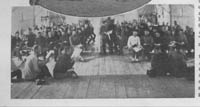 Another key component of the Association's program to improve the mental condition of POWs was the introduction of education systems
in prison camps. Education service varied greatly, depending on the backgrounds of the prisoners. A large percentage of Russian and
Serbian POWs were illiterate and were interested in learning how to read (Conrad Hoffman estimated the illiteracy rate among these
prisoners at between 75 and 85 percent).
Another key component of the Association's program to improve the mental condition of POWs was the introduction of education systems
in prison camps. Education service varied greatly, depending on the backgrounds of the prisoners. A large percentage of Russian and
Serbian POWs were illiterate and were interested in learning how to read (Conrad Hoffman estimated the illiteracy rate among these
prisoners at between 75 and 85 percent).
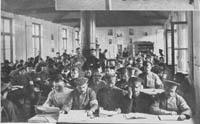 The Senior Secretary discovered that approximately 60 percent of the Italian prisoners in German POW camps were illiterate as well.
The YMCA emphasized to these prisoners the importance of learning how to read. The most immediate benefit of reading and writing
classes for illiterate POWs was their ability to write and receive letters from loved ones at home.
The Senior Secretary discovered that approximately 60 percent of the Italian prisoners in German POW camps were illiterate as well.
The YMCA emphasized to these prisoners the importance of learning how to read. The most immediate benefit of reading and writing
classes for illiterate POWs was their ability to write and receive letters from loved ones at home.
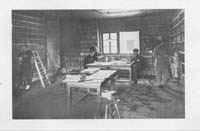 This was a great source of joy for these men. By spending their time in captivity studying basic math and reading skills, these men
could return home, get better jobs, and improve their families' standard of living. At Worms, Carl T. Michel found over one hundred
illiterate Russians in a single company, and immediately set up a school with the support of the camp commandant. Camp officials
provided rooms for classes, and the American YMCA provided textbooks. Michel reported that over 150 students enrolled when the school
was opened.7
This was a great source of joy for these men. By spending their time in captivity studying basic math and reading skills, these men
could return home, get better jobs, and improve their families' standard of living. At Worms, Carl T. Michel found over one hundred
illiterate Russians in a single company, and immediately set up a school with the support of the camp commandant. Camp officials
provided rooms for classes, and the American YMCA provided textbooks. Michel reported that over 150 students enrolled when the school
was opened.7
7
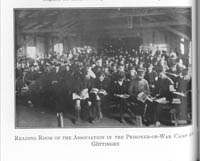 Association schools also catered to more advanced students. While the YMCA provided equipment to operate schools, the prisoners provided
the labor to run the classes. Field secretaries sought volunteers from among the camp population who had experience as teachers, professors,
or professionals to teach eager students. With the assistance of the secretary, the POWs formed an Education Committee as part of their
camp's Association. Then the WPA Headquarters sent textbooks, office supplies, musical instruments, laboratory equipment, tools, and
other necessary support. Sometimes schools started in the open air, but most camp commandants provided rooms, if not buildings, for
YMCA-sponsored classes. The courses offered reflected the expertise of the prisoners in the camp. Most Association schools offered a
variety of foreign languages, business skills, sciences, literature, mathematics, and vocational education.
Association schools also catered to more advanced students. While the YMCA provided equipment to operate schools, the prisoners provided
the labor to run the classes. Field secretaries sought volunteers from among the camp population who had experience as teachers, professors,
or professionals to teach eager students. With the assistance of the secretary, the POWs formed an Education Committee as part of their
camp's Association. Then the WPA Headquarters sent textbooks, office supplies, musical instruments, laboratory equipment, tools, and
other necessary support. Sometimes schools started in the open air, but most camp commandants provided rooms, if not buildings, for
YMCA-sponsored classes. The courses offered reflected the expertise of the prisoners in the camp. Most Association schools offered a
variety of foreign languages, business skills, sciences, literature, mathematics, and vocational education.
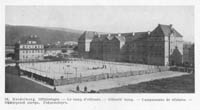 Prison camps often had over one thousand students attending the Association school; advanced students did not want to waste time during their
incarceration. The Germans exempted imprisoned university students from labor detachments, which allowed them to continue their studies.
Through the American YMCA, the prison camps at Ruhleben, Göttingen, Heidelberg, Dresden, Cottbus, and Villingen established special
relationships with professors at neighboring universities. Professors agreed to teach classes and give lectures to advanced students.
These universities and the Royal Library in Berlin even extended book-borrowing privileges to war prisoners. Advanced students also
received special consideration from German officials. Forty-five French officers conducted scientific research in prison camps using
equipment provided by the YMCA. Lieutenant Dr. Beszenoff, a Russian bacteriologist before the war, worked in a special laboratory in
Frankfurt-am-Main during the war.8
Prison camps often had over one thousand students attending the Association school; advanced students did not want to waste time during their
incarceration. The Germans exempted imprisoned university students from labor detachments, which allowed them to continue their studies.
Through the American YMCA, the prison camps at Ruhleben, Göttingen, Heidelberg, Dresden, Cottbus, and Villingen established special
relationships with professors at neighboring universities. Professors agreed to teach classes and give lectures to advanced students.
These universities and the Royal Library in Berlin even extended book-borrowing privileges to war prisoners. Advanced students also
received special consideration from German officials. Forty-five French officers conducted scientific research in prison camps using
equipment provided by the YMCA. Lieutenant Dr. Beszenoff, a Russian bacteriologist before the war, worked in a special laboratory in
Frankfurt-am-Main during the war.8
8
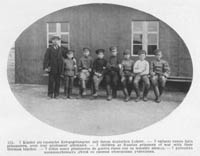 The YMCA was also concerned with the large number of boys in German prison camps. When fathers received their mobilization orders for
the Russian and Serbian armies, many of their under-aged sons joined them in the ranks and followed them into captivity. A large number
of the young prisoners had run away from home to join the army-they wanted to drop out of school and join the great adventure.
The YMCA was also concerned with the large number of boys in German prison camps. When fathers received their mobilization orders for
the Russian and Serbian armies, many of their under-aged sons joined them in the ranks and followed them into captivity. A large number
of the young prisoners had run away from home to join the army-they wanted to drop out of school and join the great adventure.
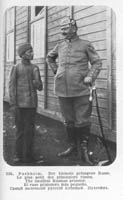 William Lawall noted the presence of these boys in most of the prison camps he visited. Most lacked supervision and were learning a
variety of vices from the older soldiers. Due to their age and military experience, the Germans refused to exchange or repatriate
these boys, since they could return to the ranks.
William Lawall noted the presence of these boys in most of the prison camps he visited. Most lacked supervision and were learning a
variety of vices from the older soldiers. Due to their age and military experience, the Germans refused to exchange or repatriate
these boys, since they could return to the ranks.
 As a result, Lawall approached the Ministry of War and recommended that all the youngsters in German prison camps be concentrated in
one facility where the Association could set up a program for them. German officials welcomed the proposal, and the YMCA received the
support of a Russian physician. The Germans had found these boys difficult to control and agreed that they should be segregated from
the older men. By the fall of 1916, the Ministry of War decided to send the boys to Hammerstein, and asked the American YMCA to set
up a school for them. These boys now had the opportunity to learn a trade so they could be gainfully employed once they returned home
after the war. The American YMCA assumed responsibility for over 1,500 boys incarcerated at Hammerstein.9
As a result, Lawall approached the Ministry of War and recommended that all the youngsters in German prison camps be concentrated in
one facility where the Association could set up a program for them. German officials welcomed the proposal, and the YMCA received the
support of a Russian physician. The Germans had found these boys difficult to control and agreed that they should be segregated from
the older men. By the fall of 1916, the Ministry of War decided to send the boys to Hammerstein, and asked the American YMCA to set
up a school for them. These boys now had the opportunity to learn a trade so they could be gainfully employed once they returned home
after the war. The American YMCA assumed responsibility for over 1,500 boys incarcerated at Hammerstein.9
9
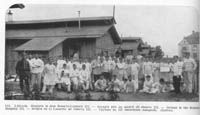 Another special target group for Association education programs was seriously wounded and invalid prisoners. Most of these men would
not be able to return to their pre-war trades. When they returned home without any means of making a living, they would be a burden on
their communities; their families would suffer a lowered standard of living, since their primary bread-winner would no longer be
employed.
Another special target group for Association education programs was seriously wounded and invalid prisoners. Most of these men would
not be able to return to their pre-war trades. When they returned home without any means of making a living, they would be a burden on
their communities; their families would suffer a lowered standard of living, since their primary bread-winner would no longer be
employed.
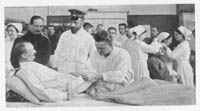 To avoid this, the YMCA strove to rehabilitate these prisoners by building up their physical condition and teaching them new skills.
First, YMCA secretaries encouraged the POWs to play sports (especially volleyball) and exercise through gymnastics. Physical activity
helped these men recuperate in the fresh air, regain some use of their wounded limbs, and learn how to accommodate their new disabilities.
Lawall was instrumental in organizing Association invalid programs. At Hammerstein, Lawall established a school for crippled Russian
prisoners in the summer of 1916. Approximately 85 percent of these men had been farmers before the war and would no longer be able to
work in the fields.
To avoid this, the YMCA strove to rehabilitate these prisoners by building up their physical condition and teaching them new skills.
First, YMCA secretaries encouraged the POWs to play sports (especially volleyball) and exercise through gymnastics. Physical activity
helped these men recuperate in the fresh air, regain some use of their wounded limbs, and learn how to accommodate their new disabilities.
Lawall was instrumental in organizing Association invalid programs. At Hammerstein, Lawall established a school for crippled Russian
prisoners in the summer of 1916. Approximately 85 percent of these men had been farmers before the war and would no longer be able to
work in the fields.
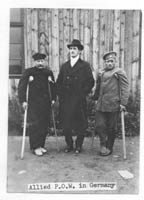 At this school, invalids learned shoemaking and tailoring skills. He then set up an invalid school at Schütt in the fall of 1916. The
Germans assigned two thousand wounded and crippled Russian prisoners to this military hospital (the patient population had doubled by September
1917). At the Association school, these POWs learned to read, write, weave baskets, weave braid for straw hats, weave horse-hair for
watch chains, and carve wood. For the YMCA, invalid rehabilitation was an important component of post-war reconstruction.10
At this school, invalids learned shoemaking and tailoring skills. He then set up an invalid school at Schütt in the fall of 1916. The
Germans assigned two thousand wounded and crippled Russian prisoners to this military hospital (the patient population had doubled by September
1917). At the Association school, these POWs learned to read, write, weave baskets, weave braid for straw hats, weave horse-hair for
watch chains, and carve wood. For the YMCA, invalid rehabilitation was an important component of post-war reconstruction.10
Religious Services
10
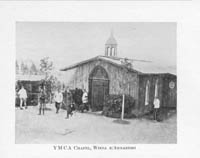 Under the agreement with the German government, the American YMCA made no attempt to conduct sectarian religious services.
The Association did, however, promote spiritual relief among depressed prisoners. WPA field secretaries provided an
ecumenical service to POWs, opening the Association programs to all men, regardless of creed. YMCA huts were not only
open for Roman Catholic, Russian Orthodox, Jewish, and Muslim religious services, but space was specifically allocated
for separate altars for each religion. When not in use, Association officials partitioned these sacred areas off from
the general public to guarantee sanctity. For the general prison population, WPA secretaries offered non-sectarian
religious and moral talks, usually on Sunday evenings. They also organized Bible study groups for weekday evenings to
help prisoners translate religion into daily life. The field secretaries usually worked with the religion committee of
the camp Association and the German military authorities to invite civilian priests or rabbis to the prison, or to
support incarcerated clergy who could conduct services. These religion committees strove to increase attendance at
church services and maintain the church when ministers or the Association secretary were unavailable. Red Triangle
secretaries did lead Protestant church services for POWs in many prison camps (a large number of American secretaries
were ordained ministers). They also conducted evangelistic campaigns among the Protestant POWs, which were open to other
interested individuals. Hoffman and James E. Sprunger supervised a major revival at Ruhleben, and the Senior Secretary
conducted drives in other camps. On a rainy night at one prison, Hoffman held a meeting in a large tent that contained
British, French, and Russian POWs. Hoffman opened the evening with a moral talk and the singing of old Gospel songs.
French and Russian prisoners soon gained interest in the activity and joined the English POWs. The American secretary
remarked, "here it was unnecessary to 'go out to all nations and preach the Gospel,' for here all nations had come
together."11
Under the agreement with the German government, the American YMCA made no attempt to conduct sectarian religious services.
The Association did, however, promote spiritual relief among depressed prisoners. WPA field secretaries provided an
ecumenical service to POWs, opening the Association programs to all men, regardless of creed. YMCA huts were not only
open for Roman Catholic, Russian Orthodox, Jewish, and Muslim religious services, but space was specifically allocated
for separate altars for each religion. When not in use, Association officials partitioned these sacred areas off from
the general public to guarantee sanctity. For the general prison population, WPA secretaries offered non-sectarian
religious and moral talks, usually on Sunday evenings. They also organized Bible study groups for weekday evenings to
help prisoners translate religion into daily life. The field secretaries usually worked with the religion committee of
the camp Association and the German military authorities to invite civilian priests or rabbis to the prison, or to
support incarcerated clergy who could conduct services. These religion committees strove to increase attendance at
church services and maintain the church when ministers or the Association secretary were unavailable. Red Triangle
secretaries did lead Protestant church services for POWs in many prison camps (a large number of American secretaries
were ordained ministers). They also conducted evangelistic campaigns among the Protestant POWs, which were open to other
interested individuals. Hoffman and James E. Sprunger supervised a major revival at Ruhleben, and the Senior Secretary
conducted drives in other camps. On a rainy night at one prison, Hoffman held a meeting in a large tent that contained
British, French, and Russian POWs. Hoffman opened the evening with a moral talk and the singing of old Gospel songs.
French and Russian prisoners soon gained interest in the activity and joined the English POWs. The American secretary
remarked, "here it was unnecessary to 'go out to all nations and preach the Gospel,' for here all nations had come
together."11
11
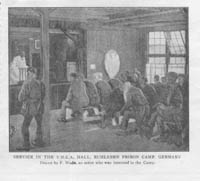 They sang hymns, read passages from the Bible, and closed the meeting with the Lord's Prayer. Then Hoffman
offered the men hot chocolate and white bread for refreshments. He found the prison camps a fertile ground for
religious work. In addition, the WPA field secretaries provided Bibles and spiritual tracts to all Christian
prisoners.
They sang hymns, read passages from the Bible, and closed the meeting with the Lord's Prayer. Then Hoffman
offered the men hot chocolate and white bread for refreshments. He found the prison camps a fertile ground for
religious work. In addition, the WPA field secretaries provided Bibles and spiritual tracts to all Christian
prisoners.
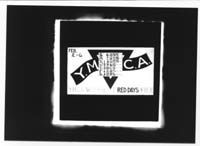 The American YMCA worked closely with the World's Sunday School Association, which had provided three hundred thousand New
Testaments to POWs for the YMCA to distribute by July 1915. They then planned to get one million New Testaments
for POWs through a nickel campaign. Harte requested Gospels in English, French, Russian, and Flemish to meet
demand.12
The American YMCA worked closely with the World's Sunday School Association, which had provided three hundred thousand New
Testaments to POWs for the YMCA to distribute by July 1915. They then planned to get one million New Testaments
for POWs through a nickel campaign. Harte requested Gospels in English, French, Russian, and Flemish to meet
demand.12
12
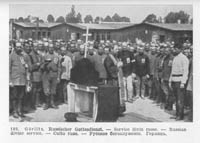 The American YMCA focused a great deal of its religious work among the Orthodox POWs, particularly the Russian,
Serbian, and Romanian prisoners. While French and Italian POWs had ready access to German Roman Catholic priests,
the Orthodox prisoners were relatively isolated from spiritual comfort. Before the war, Mott had worked to gain
access to Orthodox nations-although with few tangible results-as part of the YMCA's campaign to "evangelize the
world in this generation."
The American YMCA focused a great deal of its religious work among the Orthodox POWs, particularly the Russian,
Serbian, and Romanian prisoners. While French and Italian POWs had ready access to German Roman Catholic priests,
the Orthodox prisoners were relatively isolated from spiritual comfort. Before the war, Mott had worked to gain
access to Orthodox nations-although with few tangible results-as part of the YMCA's campaign to "evangelize the
world in this generation."
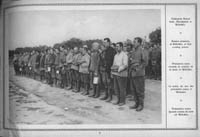 From an Association perspective, working with Eastern European POWs in the Central Power prison camps offered the
opportunity to introduce the YMCA program at the grass roots level. While the secretaries hoped to imbue the
Association spirit in as many Russians as possible, and possibly even attract future secretaries (the YMCA recognized
that native secretaries were more readily accepted than foreign Red Triangle workers), their primary goal was to build
friendships and name recognition among these prisoners. When these men returned home, they would remember the
Association's work. In the future, when a Foreign Work secretary arrived in their hometowns, it was hoped that the
former POWs would welcome the organization and help get it started in Orthodox countries.13
From an Association perspective, working with Eastern European POWs in the Central Power prison camps offered the
opportunity to introduce the YMCA program at the grass roots level. While the secretaries hoped to imbue the
Association spirit in as many Russians as possible, and possibly even attract future secretaries (the YMCA recognized
that native secretaries were more readily accepted than foreign Red Triangle workers), their primary goal was to build
friendships and name recognition among these prisoners. When these men returned home, they would remember the
Association's work. In the future, when a Foreign Work secretary arrived in their hometowns, it was hoped that the
former POWs would welcome the organization and help get it started in Orthodox countries.13
13
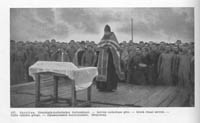 The Association supported Russian Orthodox services in a number of important ways. Many Russian prisoners sent
in requests for religious mementos to the YMCA. The Petrograd WPA Office sent three hundred thousand icons and small crosses
donated by Tsarina Alexandra Feodorovna to the Berlin office for distribution among Russian POWs in Germany. The
American YMCA also presented Russian Gospels and Scriptures to prisoners upon request. More importantly, the
Association supported Orthodox religious services in German prison camps by supplying Orthodox ritual books to
priests through the YMCA office in Stockholm. Through extensive diplomatic negotiations, the Association was able
to procure antimensia (special altar cloths essential for Orthodox church rituals). These cloths could not be
procured in Germany because they were required to be produced under strict religious standards.
The Association supported Russian Orthodox services in a number of important ways. Many Russian prisoners sent
in requests for religious mementos to the YMCA. The Petrograd WPA Office sent three hundred thousand icons and small crosses
donated by Tsarina Alexandra Feodorovna to the Berlin office for distribution among Russian POWs in Germany. The
American YMCA also presented Russian Gospels and Scriptures to prisoners upon request. More importantly, the
Association supported Orthodox religious services in German prison camps by supplying Orthodox ritual books to
priests through the YMCA office in Stockholm. Through extensive diplomatic negotiations, the Association was able
to procure antimensia (special altar cloths essential for Orthodox church rituals). These cloths could not be
procured in Germany because they were required to be produced under strict religious standards.
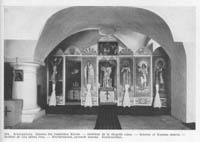 The antimension had to be blessed by the Bishop of the Greek Church in Petrograd, and could not be touched by any
lay people once consecrated. But shipping antimensia to Germany for use in POW camps presented difficulties, since
German customs and censorship authorities insisted on examining all incoming packages. Such an investigation would
violate the sanctity of the altar cloths. The YMCA negotiated a solution to this dilemma. The Russian Holy Synod
agreed to bless and deliver a dozen antimensia in a carefully sealed package carried by a Russian Red Cross sister.
Hoffman met the sister at the frontier, accompanied by an Orthodox priest. The Russian clergyman opened the package
in the presence of German officials for visual inspection. Once approved, the cloths continued their journey to prison
camps, so that thousands of Orthodox prisoners could enjoy religious services.14
The antimension had to be blessed by the Bishop of the Greek Church in Petrograd, and could not be touched by any
lay people once consecrated. But shipping antimensia to Germany for use in POW camps presented difficulties, since
German customs and censorship authorities insisted on examining all incoming packages. Such an investigation would
violate the sanctity of the altar cloths. The YMCA negotiated a solution to this dilemma. The Russian Holy Synod
agreed to bless and deliver a dozen antimensia in a carefully sealed package carried by a Russian Red Cross sister.
Hoffman met the sister at the frontier, accompanied by an Orthodox priest. The Russian clergyman opened the package
in the presence of German officials for visual inspection. Once approved, the cloths continued their journey to prison
camps, so that thousands of Orthodox prisoners could enjoy religious services.14
14
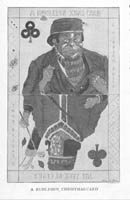 Celebration of the Christmas season was another important facet of Association work on behalf of POWs in Germany.
The yuletide season fostered depression among the prisoners, who were far from home and yearned for their families.
Hoffman and Sprunger were limited in what they could accomplish for POWs during the first Christmas season of their
work in December 1915, but the expanded force of American secretaries strove to spread Christmas cheer to as many
prisoners as possible the following year.
Celebration of the Christmas season was another important facet of Association work on behalf of POWs in Germany.
The yuletide season fostered depression among the prisoners, who were far from home and yearned for their families.
Hoffman and Sprunger were limited in what they could accomplish for POWs during the first Christmas season of their
work in December 1915, but the expanded force of American secretaries strove to spread Christmas cheer to as many
prisoners as possible the following year.
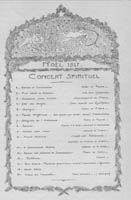 Michel noted that, as the holidays approached, some men asked for passes to cross the border as presents, which
demonstrated they still had a sense of humor. Several Allied officers were willing to pay a small fortune for a
turkey or goose for their Christmas dinner, but such delicacies were becoming rare in Germany at any price. The WPA
Office in Berlin prepared well in advance for Christmas. The office workers sent out hundreds of entertainment boxes
to prison camps for distribution to labor detachments. Each box contained several games and one or two musical
instruments. The YMCA conducted a Christmas card design contest among the POWs, and the Association had 10,000 copies
of the winning entry printed. These cards were then distributed among the POWs to send back home. Thousands of other
Christmas cards followed for posting by the prisoners. The YMCA also had thousands of specially designed New Year's
cards produced for Russian and Polish prisoners. The WPA field secretary in Saxony, E. O. Jacob, conducted similar
operations for POWs in Saxon prison camps.15
Michel noted that, as the holidays approached, some men asked for passes to cross the border as presents, which
demonstrated they still had a sense of humor. Several Allied officers were willing to pay a small fortune for a
turkey or goose for their Christmas dinner, but such delicacies were becoming rare in Germany at any price. The WPA
Office in Berlin prepared well in advance for Christmas. The office workers sent out hundreds of entertainment boxes
to prison camps for distribution to labor detachments. Each box contained several games and one or two musical
instruments. The YMCA conducted a Christmas card design contest among the POWs, and the Association had 10,000 copies
of the winning entry printed. These cards were then distributed among the POWs to send back home. Thousands of other
Christmas cards followed for posting by the prisoners. The YMCA also had thousands of specially designed New Year's
cards produced for Russian and Polish prisoners. The WPA field secretary in Saxony, E. O. Jacob, conducted similar
operations for POWs in Saxon prison camps.15
15
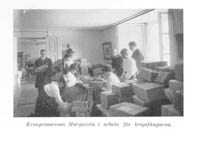 Foreign welfare agencies took advantage of the American WPA secretaries' direct contact with prisoners during the
Christmas season. Crown Princess Margaret of Sweden sent thousands of gifts and photo-cards with pictures of the
princess and her children with Christmas greetings to war prisoners recovering in infirmaries. A Russian countess
donated five hundred Marks to the American YMCA for secretaries to purchase sausage in Denmark for two hundred sick and crippled
Russian POWs in a military hospital in Berlin. Another man gave three thousand Marks, with which the Association bought
sausages and tea in Denmark for over six thousand Russian prisoners in another lazarette. On January 7, Orthodox Christmas
Day, American secretaries distributed these parcels along with other gifts. They also provided Christmas trees with
electric lights and a gramophone with Russian records for a concert. The Swedish and Norwegian National YMCA Councils
sent thousands of presents to needy Russian prisoners to remind them that they were remembered during the holidays. In
addition, relief organizations in Sweden, Norway, and Denmark sent thousands of individual parcels for the Association
to distribute among the more than three hundred refugee children at the internment camp at Holzminden in Prussia.16
Foreign welfare agencies took advantage of the American WPA secretaries' direct contact with prisoners during the
Christmas season. Crown Princess Margaret of Sweden sent thousands of gifts and photo-cards with pictures of the
princess and her children with Christmas greetings to war prisoners recovering in infirmaries. A Russian countess
donated five hundred Marks to the American YMCA for secretaries to purchase sausage in Denmark for two hundred sick and crippled
Russian POWs in a military hospital in Berlin. Another man gave three thousand Marks, with which the Association bought
sausages and tea in Denmark for over six thousand Russian prisoners in another lazarette. On January 7, Orthodox Christmas
Day, American secretaries distributed these parcels along with other gifts. They also provided Christmas trees with
electric lights and a gramophone with Russian records for a concert. The Swedish and Norwegian National YMCA Councils
sent thousands of presents to needy Russian prisoners to remind them that they were remembered during the holidays. In
addition, relief organizations in Sweden, Norway, and Denmark sent thousands of individual parcels for the Association
to distribute among the more than three hundred refugee children at the internment camp at Holzminden in Prussia.16
16
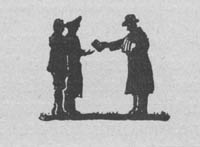 Individual secretaries did all they could to spread Christmas cheer. One American secretary hired an automobile
and played Santa Claus. He drove between working detachments in his region, giving gramophone concerts and distributing
books, pictures, games (chess, dominoes, lotto, and Halma), puzzles, mouth organs, Jews' harps, accordions, cigarettes,
chocolate, small parcels, and Christmas cards as presents. A senior Russian prisoner passed the hat to give the secretary
a small token of their appreciation as a Christmas present. Other secretaries purchased oranges and apples for the sick
prisoners they visited. They arranged special seasonal concerts, vaudeville performances, lantern-slide lectures, and
religious services. In several prison camps, the YMCA provided Christmas candles, trees, and bags of fruit. For example,
the WPA field secretary assigned to Württemberg supplied the Christmas trees for the Allied prisoners in the military
hospital in Stuttgart.
Individual secretaries did all they could to spread Christmas cheer. One American secretary hired an automobile
and played Santa Claus. He drove between working detachments in his region, giving gramophone concerts and distributing
books, pictures, games (chess, dominoes, lotto, and Halma), puzzles, mouth organs, Jews' harps, accordions, cigarettes,
chocolate, small parcels, and Christmas cards as presents. A senior Russian prisoner passed the hat to give the secretary
a small token of their appreciation as a Christmas present. Other secretaries purchased oranges and apples for the sick
prisoners they visited. They arranged special seasonal concerts, vaudeville performances, lantern-slide lectures, and
religious services. In several prison camps, the YMCA provided Christmas candles, trees, and bags of fruit. For example,
the WPA field secretary assigned to Württemberg supplied the Christmas trees for the Allied prisoners in the military
hospital in Stuttgart.
17
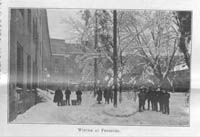 The candles that added the magical touch to Christmas trees were especially difficult for Hoffman to find for the
Christmas 1917 celebrations. Because fat had virtually disappeared from the German market by this time, candles were
a challenge to obtain. The Senior Secretary was able to procure over two thousand candles during the year, which permitted the
WPA Office in Berlin to send each prison camp in Germany a few candles. In addition, the YMCA sent wine and bread to
camps so that the POWs could celebrate High Mass during the Christmas services. The secretaries also promoted the Christmas
spirit among the incarcerated by encouraging Association Welfare Committees to remember the needy prisoners among them.
At Dyrotz, British POWs saved part of their food parcel supplies for several weeks as Christmas gifts for poor Russian
POWs. In an officers' camp, the men collected 7,500 Marks to purchase gifts for deserving privates in other prisons. At
Ruhleben, the internees collected four hundred pairs of woolen socks for poor Serbian POWs. The American YMCA distributed Christmas
presents to as many Russian, Serbian, and Romanian prisoners as possible. In some camps, the Association set up a lottery
system where lucky POWs could win oranges, apples, gingerbread (Lebkuchen), cigarettes, Christmas cards, or
crucifixes. Serbian prisoners at Halbe appreciated the American YMCA's Christmas cheer, echoing the other POWs in their
fervent Christmas wishes for peace and the chance to return home.17
The candles that added the magical touch to Christmas trees were especially difficult for Hoffman to find for the
Christmas 1917 celebrations. Because fat had virtually disappeared from the German market by this time, candles were
a challenge to obtain. The Senior Secretary was able to procure over two thousand candles during the year, which permitted the
WPA Office in Berlin to send each prison camp in Germany a few candles. In addition, the YMCA sent wine and bread to
camps so that the POWs could celebrate High Mass during the Christmas services. The secretaries also promoted the Christmas
spirit among the incarcerated by encouraging Association Welfare Committees to remember the needy prisoners among them.
At Dyrotz, British POWs saved part of their food parcel supplies for several weeks as Christmas gifts for poor Russian
POWs. In an officers' camp, the men collected 7,500 Marks to purchase gifts for deserving privates in other prisons. At
Ruhleben, the internees collected four hundred pairs of woolen socks for poor Serbian POWs. The American YMCA distributed Christmas
presents to as many Russian, Serbian, and Romanian prisoners as possible. In some camps, the Association set up a lottery
system where lucky POWs could win oranges, apples, gingerbread (Lebkuchen), cigarettes, Christmas cards, or
crucifixes. Serbian prisoners at Halbe appreciated the American YMCA's Christmas cheer, echoing the other POWs in their
fervent Christmas wishes for peace and the chance to return home.17
18 Hoffman reported on his own efforts to spread Christmas cheer among the POWs in the vicinity of Berlin. On Christmas Eve in 1916, Hoffman and four Russian doctors visited a military hospital for Christmas celebrations. A sea of sick and wounded prisoners included English, French, and Russian men, along with one lonely Senegalese. Two Christmas trees with lighted candles were the highlight of the festivities. Hoffman described the scene:
One instinctively felt the effort being made to drive away those painful thoughts of the loved ones at home, to replace by temporary distraction the yearning in the hearts of many. For these men, there was no Christmas dinner. For many it was their third Christmas in prison.18
19
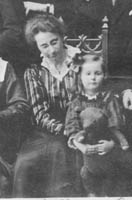 After the entertainment, Hoffman visited those POWs too sick to leave their beds. He wished he could have given them
eggs, milk, bread, or fruit, but the Allied blockade made these items too scarce. On Christmas Day, Hoffman took his
four-year old daughter, Louise, to visit Ruhleben. He never realized the "heart hunger" of these men until he saw
their response to the first child they had seen in almost three years. She ran around the Association hall and men
came from all over the camp to see the miracle of a child. Many cried, others stood in line for the chance to have her
sit on their laps, and most were able to forget the bitterness of imprisonment in the thoughts of their little ones at
home.19
After the entertainment, Hoffman visited those POWs too sick to leave their beds. He wished he could have given them
eggs, milk, bread, or fruit, but the Allied blockade made these items too scarce. On Christmas Day, Hoffman took his
four-year old daughter, Louise, to visit Ruhleben. He never realized the "heart hunger" of these men until he saw
their response to the first child they had seen in almost three years. She ran around the Association hall and men
came from all over the camp to see the miracle of a child. Many cried, others stood in line for the chance to have her
sit on their laps, and most were able to forget the bitterness of imprisonment in the thoughts of their little ones at
home.19
20
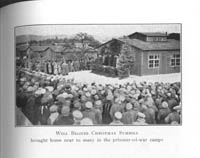 Christmas 1917 was even more difficult for Hoffman. The WPA program was hampered by the loss of American secretaries
after the United States entered the war and replacement secretaries from neutral nations were slow in arriving. As an
enemy alien, Hoffman no longer enjoyed unlimited prison camp visitation. All he could do was invite his Sunday School
class to his rooms for a little Christmas entertainment. He had saved enough sweets from his rations to give each guest
two pieces of candy, an apple, and a small piece of cake. He also put away cocoa and a can of condensed milk for the
celebrations (although his guests had to bring along their own cups). The Senior Secretary had a difficult time deciding
on gifts for his friends, especially since inflation had increased prices so much in Germany. "Old rubbish that had been
stored away for years was commanding staggering prices," he wrote. For Hoffman, December 1917 was a difficult Christmas,
since his hands were tied when POWs were in their greatest need.20
Christmas 1917 was even more difficult for Hoffman. The WPA program was hampered by the loss of American secretaries
after the United States entered the war and replacement secretaries from neutral nations were slow in arriving. As an
enemy alien, Hoffman no longer enjoyed unlimited prison camp visitation. All he could do was invite his Sunday School
class to his rooms for a little Christmas entertainment. He had saved enough sweets from his rations to give each guest
two pieces of candy, an apple, and a small piece of cake. He also put away cocoa and a can of condensed milk for the
celebrations (although his guests had to bring along their own cups). The Senior Secretary had a difficult time deciding
on gifts for his friends, especially since inflation had increased prices so much in Germany. "Old rubbish that had been
stored away for years was commanding staggering prices," he wrote. For Hoffman, December 1917 was a difficult Christmas,
since his hands were tied when POWs were in their greatest need.20
21
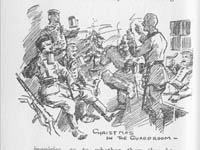 The American YMCA did not forget German guards during the Christmas season. Hoffman had a budget of two thousand Marks,
which the Association used to bring these men-"many just as lonely and homesick as the prisoners of war"-a little
Christmas joy. The YMCA distributed Christmas parcels to these lonely guards that included games, musical instruments,
and Christmas candles.
The Association also made sure that other German officials were not forgotten. The YMCA sent cigarettes to labor
detachment guards, and cigars to bureaucrats in administrative departments. While "Y" officials recognized that
maintaining good relations with German authorities was important, this service to guards during the holidays was
given in the spirit of the season.21
The American YMCA did not forget German guards during the Christmas season. Hoffman had a budget of two thousand Marks,
which the Association used to bring these men-"many just as lonely and homesick as the prisoners of war"-a little
Christmas joy. The YMCA distributed Christmas parcels to these lonely guards that included games, musical instruments,
and Christmas candles.
The Association also made sure that other German officials were not forgotten. The YMCA sent cigarettes to labor
detachment guards, and cigars to bureaucrats in administrative departments. While "Y" officials recognized that
maintaining good relations with German authorities was important, this service to guards during the holidays was
given in the spirit of the season.21
22
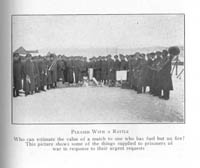 The American YMCA spared no expense to make the Christmas season as festive as possible for Allied POWs in Germany
during the war. For Christmas 1916, the Berlin WPA Office distributed 1,700 games, 1,650 candles and holders, 165
musical instruments, 4,500 cigarettes, and 1,100 cigars to POWs in prison camps across the breadth of the German
Empire. For the millions of Allied prisoners incarcerated across Germany, these gifts barely met their needs, although
the Association sought to supply presents that would benefit as many men as possible through Christmas tree decorations,
games, and music.
The American YMCA spared no expense to make the Christmas season as festive as possible for Allied POWs in Germany
during the war. For Christmas 1916, the Berlin WPA Office distributed 1,700 games, 1,650 candles and holders, 165
musical instruments, 4,500 cigarettes, and 1,100 cigars to POWs in prison camps across the breadth of the German
Empire. For the millions of Allied prisoners incarcerated across Germany, these gifts barely met their needs, although
the Association sought to supply presents that would benefit as many men as possible through Christmas tree decorations,
games, and music.
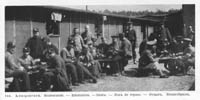 Due to the Allied blockade, Red Triangle secretaries found it difficult to obtain supplies that could be distributed
as Christmas presents, but prisoners appreciated even the smallest gifts as they passed through the Yuletide far from
family and friends. In December 1917, the American YMCA spent two hundred thousand Marks on Christmas supplies alone. Hoffman
recognized the Association's efforts were but "a drop in the bucket if all the prisoners of war were to be
reached."22
Due to the Allied blockade, Red Triangle secretaries found it difficult to obtain supplies that could be distributed
as Christmas presents, but prisoners appreciated even the smallest gifts as they passed through the Yuletide far from
family and friends. In December 1917, the American YMCA spent two hundred thousand Marks on Christmas supplies alone. Hoffman
recognized the Association's efforts were but "a drop in the bucket if all the prisoners of war were to be
reached."22
23
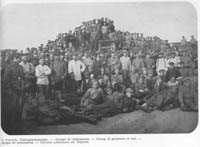 Another aspect of the Association's spiritual program was relief from mental anguish through communication between
POWs and their families. Under the Hague Agreements, POWs in Germany could send two letters a month and one postcard
per week from the camps, and were entitled to receive unrestricted correspondence. Letter writing was supported in a
number of ways. At a personal level, WPA field secretaries encouraged prisoners to write home by providing stationery
and postage-paid envelopes. They often visited hospitals and wrote letters home for incapacitated patients.
At Czersk, Lawall worked among three thousand sick and wounded Russian POWs and helped them communicate their situation to
Another aspect of the Association's spiritual program was relief from mental anguish through communication between
POWs and their families. Under the Hague Agreements, POWs in Germany could send two letters a month and one postcard
per week from the camps, and were entitled to receive unrestricted correspondence. Letter writing was supported in a
number of ways. At a personal level, WPA field secretaries encouraged prisoners to write home by providing stationery
and postage-paid envelopes. They often visited hospitals and wrote letters home for incapacitated patients.
At Czersk, Lawall worked among three thousand sick and wounded Russian POWs and helped them communicate their situation to
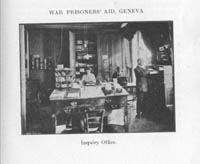 their families. Prisoners often feared that inaccurate information about their condition could cause their loved
ones unnecessary pain. A naval officer at Worms who had escaped the sinking of his warship was frantic because he
had received no news from home. Michel arranged to have a cable sent via the Netherlands to assure the officer's
family that he was safe. Secretaries provided letter-writing services to illiterate prisoners, but also encouraged
them to learn to read and write so they could correspond directly. At the national level, the YMCA maintained an
extensive POW information bureau in the belligerent nations' capitals. These administrative bodies provided POW
families with information regarding the physical condition and location of their incarcerated loved ones, and
offered services such as the transmission of money and correspondence. Maintaining contact with friends and family
helped POWs maintain a healthy mental attitude.23
their families. Prisoners often feared that inaccurate information about their condition could cause their loved
ones unnecessary pain. A naval officer at Worms who had escaped the sinking of his warship was frantic because he
had received no news from home. Michel arranged to have a cable sent via the Netherlands to assure the officer's
family that he was safe. Secretaries provided letter-writing services to illiterate prisoners, but also encouraged
them to learn to read and write so they could correspond directly. At the national level, the YMCA maintained an
extensive POW information bureau in the belligerent nations' capitals. These administrative bodies provided POW
families with information regarding the physical condition and location of their incarcerated loved ones, and
offered services such as the transmission of money and correspondence. Maintaining contact with friends and family
helped POWs maintain a healthy mental attitude.23
Social Services and Entertainment
24
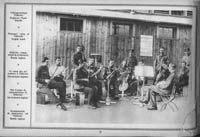 Another important element of the Association's Four-fold Program was entertainment for POWs. Mental diversions
allowed POWs to temporarily forget about the situation they faced. Music was one of the most important parts of
this service. The American YMCA provided a variety of musical instruments and sheet music so that the POWs could
organize orchestras, bands, and choirs. Between March 1915 and June 1917, the American YMCA spent twenty thousand Marks on
musical instruments for POWs in Germany.
Once organized, bands, choruses, and orchestras provided evening performances for the POWs and the guards, as well
as music for religious services, at theatrical performances, and at funerals. Most camps had talented musicians
among the ranks who worked hard to develop the music programs. Not only did they lead the bands and orchestras,
Another important element of the Association's Four-fold Program was entertainment for POWs. Mental diversions
allowed POWs to temporarily forget about the situation they faced. Music was one of the most important parts of
this service. The American YMCA provided a variety of musical instruments and sheet music so that the POWs could
organize orchestras, bands, and choirs. Between March 1915 and June 1917, the American YMCA spent twenty thousand Marks on
musical instruments for POWs in Germany.
Once organized, bands, choruses, and orchestras provided evening performances for the POWs and the guards, as well
as music for religious services, at theatrical performances, and at funerals. Most camps had talented musicians
among the ranks who worked hard to develop the music programs. Not only did they lead the bands and orchestras,
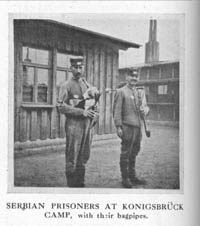 they offered lessons to POWs, who were eager to learn how to play a variety of instruments. The prisoners could draw
up a wish list of instruments and musical scores and send it through the YMCA field secretary to the WPA Office in
Berlin. At Döberitz, the POWs organized the "Prisoners' International Orchestra," and the Association provided
a cornet, flute, French horn, violoncello, castanets, and a tambourine to fill out the orchestra.
The Association sent an organ and stringed instruments to the officers' prison camp at Werl for Russian prisoners.
At Königsbrück in Saxony, Jacob equipped a Serbian gypsy orchestra, while Michel organized and
equipped an orchestra at Worms. The YMCA also provided sheet music for the chorus at Schneidemühl, which
allowed the prisoners to produce a show that greatly helped improve camp morale. Often, the musical talents of
field secretaries helped ease prisoners' suffering. Michel reported that POWs at Friedberg took special comfort
in his music. The benefits of music could even be extended to far-flung labor detachments by sending musical
instruments and scores to POWs at work sites. Michel pointed out that "music, especially singing, had charms to
soothe, cheer, and bless" the hapless prisoner of war.24
they offered lessons to POWs, who were eager to learn how to play a variety of instruments. The prisoners could draw
up a wish list of instruments and musical scores and send it through the YMCA field secretary to the WPA Office in
Berlin. At Döberitz, the POWs organized the "Prisoners' International Orchestra," and the Association provided
a cornet, flute, French horn, violoncello, castanets, and a tambourine to fill out the orchestra.
The Association sent an organ and stringed instruments to the officers' prison camp at Werl for Russian prisoners.
At Königsbrück in Saxony, Jacob equipped a Serbian gypsy orchestra, while Michel organized and
equipped an orchestra at Worms. The YMCA also provided sheet music for the chorus at Schneidemühl, which
allowed the prisoners to produce a show that greatly helped improve camp morale. Often, the musical talents of
field secretaries helped ease prisoners' suffering. Michel reported that POWs at Friedberg took special comfort
in his music. The benefits of music could even be extended to far-flung labor detachments by sending musical
instruments and scores to POWs at work sites. Michel pointed out that "music, especially singing, had charms to
soothe, cheer, and bless" the hapless prisoner of war.24
25
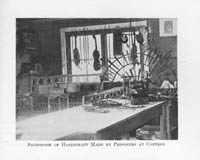 Handicrafts also diverted many prisoners from wasting idleness. The American YMCA provided tools and raw materials so that POWs in the
prison camps, military hospitals, and labor detachments could participate in wood carving, leather work, basket weaving,
carpentry, furniture making, book binding, needle work, toy making, flower arrangement, and a variety of other hobbies.
Handicrafts also diverted many prisoners from wasting idleness. The American YMCA provided tools and raw materials so that POWs in the
prison camps, military hospitals, and labor detachments could participate in wood carving, leather work, basket weaving,
carpentry, furniture making, book binding, needle work, toy making, flower arrangement, and a variety of other hobbies.
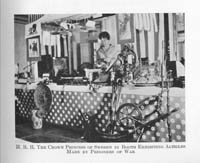 These crafts not only helped pass the time, but also improved prisoners' quality of life. The Association set up
workshops in prison camps, where trained artisans taught apprentices.
These trainees returned to civilian life with new skills and improved their families' living standards. Crown Princess
Margaret of Sweden arranged for an exhibition of POW handicrafts in Stockholm in
These crafts not only helped pass the time, but also improved prisoners' quality of life. The Association set up
workshops in prison camps, where trained artisans taught apprentices.
These trainees returned to civilian life with new skills and improved their families' living standards. Crown Princess
Margaret of Sweden arranged for an exhibition of POW handicrafts in Stockholm in
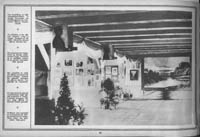 1916. At the end of the bazaar, the
articles were sold to the public, which gave the prisoners some additional income. The sale was scheduled to last for
three days, but it ended after the opening day because every article had been sold. The next year, POW handicraft
exhibitions followed in Sweden, Norway, and Denmark.25
1916. At the end of the bazaar, the
articles were sold to the public, which gave the prisoners some additional income. The sale was scheduled to last for
three days, but it ended after the opening day because every article had been sold. The next year, POW handicraft
exhibitions followed in Sweden, Norway, and Denmark.25
26
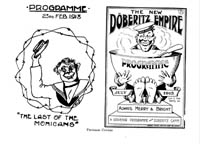 Association WPA field secretaries also played an important role in entertaining the POWs. The American YMCA provided
a wide range of equipment to ease the monotony in prison camps and hospitals. Secretaries carried gramophones and a
library of records so they could set up an impromptu gramophone concert on demand.
Association WPA field secretaries also played an important role in entertaining the POWs. The American YMCA provided
a wide range of equipment to ease the monotony in prison camps and hospitals. Secretaries carried gramophones and a
library of records so they could set up an impromptu gramophone concert on demand.
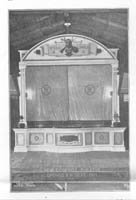 Stereopticons, radiopticons, and lantern slides also supported lectures on a wide variety of topics. Probably the
most popular of all YMCA entertainments was motion pictures.
Secretaries brought mobile motion picture projectors to camps, set up sheets on the side of a barrack, and showed
Stereopticons, radiopticons, and lantern slides also supported lectures on a wide variety of topics. Probably the
most popular of all YMCA entertainments was motion pictures.
Secretaries brought mobile motion picture projectors to camps, set up sheets on the side of a barrack, and showed
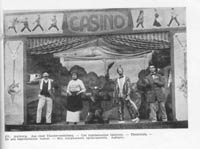 American movies in the open air for as many POWs as possible. When German authorities decided to encourage prisoners
to work on labor detachments by banning all amusements in the prison camps, it was a major blow to WPA secretaries,
but early in 1917 the Germans reversed their decision and again permitted motion picture performances.26
American movies in the open air for as many POWs as possible. When German authorities decided to encourage prisoners
to work on labor detachments by banning all amusements in the prison camps, it was a major blow to WPA secretaries,
but early in 1917 the Germans reversed their decision and again permitted motion picture performances.26
27
 The Association hut was the center of social life in German prison camps. Most featured a game room where POWs played
a variety of games including chess, checkers, dominoes, Halma, cards, and lotto. The Entertainment Committee often
The Association hut was the center of social life in German prison camps. Most featured a game room where POWs played
a variety of games including chess, checkers, dominoes, Halma, cards, and lotto. The Entertainment Committee often
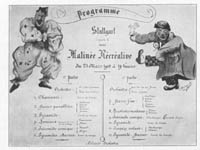 organized chess tournaments with prizes for the winners. These games helped prisoners
pass the time and cheered their
hearts. The POWs also set up organizations like debate clubs, which addressed important issues. The YMCA also provided
a great deal of support for theatrical societies in prison camps. Most Association halls had a stage, and the WPA Office
organized chess tournaments with prizes for the winners. These games helped prisoners
pass the time and cheered their
hearts. The POWs also set up organizations like debate clubs, which addressed important issues. The YMCA also provided
a great deal of support for theatrical societies in prison camps. Most Association halls had a stage, and the WPA Office
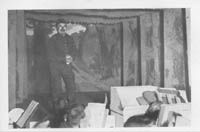 in Berlin sent scripts, costumes, and stage props to theater companies operated by Allied prisoners. Secretaries helped
organize stunt programs and comical performances in addition to serious dramatic presentations. Entertainment helped to
break the monotony of camp life and promoted a cheerful atmosphere, even if only for a short time.27
in Berlin sent scripts, costumes, and stage props to theater companies operated by Allied prisoners. Secretaries helped
organize stunt programs and comical performances in addition to serious dramatic presentations. Entertainment helped to
break the monotony of camp life and promoted a cheerful atmosphere, even if only for a short time.27
Physical Relief Services
28
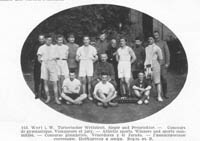 The fourth pillar of the Association's program was physical fitness. This was especially important among POWs because
the maintenance of their health was the key to their survival during their incarceration. The physical element of the
Red Triangle program was based on athletic competition and exercise. The German authorities required POWs to participate
The fourth pillar of the Association's program was physical fitness. This was especially important among POWs because
the maintenance of their health was the key to their survival during their incarceration. The physical element of the
Red Triangle program was based on athletic competition and exercise. The German authorities required POWs to participate
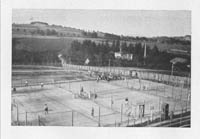 in drill and gymnastic exercises, but the YMCA provided a wide range of athletic equipment so the men could also participate
in sports. WPA field secretaries provided soccer balls, tennis equipment, volleyballs, basketballs, ice skates, and baseball
equipment. The secretaries and athletic committees in the camps then organized teams and set up leagues, complete with
in drill and gymnastic exercises, but the YMCA provided a wide range of athletic equipment so the men could also participate
in sports. WPA field secretaries provided soccer balls, tennis equipment, volleyballs, basketballs, ice skates, and baseball
equipment. The secretaries and athletic committees in the camps then organized teams and set up leagues, complete with
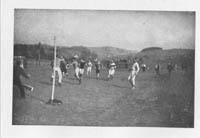 championships and prizes. Field secretaries arranged with commandants to allow prisoners on parole to take walks outside
the camp barbed wire. Walking excursions were important not only from a physical perspective, but also promoted mental
health among the POWs by providing them a change of venue. During their prison camp visits, American secretaries sometimes
championships and prizes. Field secretaries arranged with commandants to allow prisoners on parole to take walks outside
the camp barbed wire. Walking excursions were important not only from a physical perspective, but also promoted mental
health among the POWs by providing them a change of venue. During their prison camp visits, American secretaries sometimes
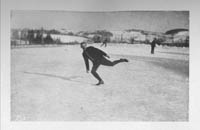 recommended changes in prisoner exercise regimens because of deficient standards. At
Werl, Olandt reported that the space
for outdoor exercises was far too limited. He suggested to the camp commandant that German authorities rent a nearby walled
garden, which could serve as a tennis court or playground. The commandant accepted the recommendation, and French, British,
and Belgian officers were soon enjoying tennis matches. This exercise resulted in a decided improvement in their general
condition.28
recommended changes in prisoner exercise regimens because of deficient standards. At
Werl, Olandt reported that the space
for outdoor exercises was far too limited. He suggested to the camp commandant that German authorities rent a nearby walled
garden, which could serve as a tennis court or playground. The commandant accepted the recommendation, and French, British,
and Belgian officers were soon enjoying tennis matches. This exercise resulted in a decided improvement in their general
condition.28
29
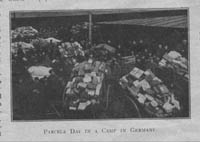 Association secretaries also addressed the problems of sick prisoners. While this type of relief fell under the purview
of the Red Cross, the YMCA still took an interest in offering these men as much assistance as possible. WPA field
secretaries visited POWs in military hospitals and offered them entertainment, reading material, religious books,
cigarettes, and delicacies. Secretaries had dentists visit the camps; Michel had a prisoner's false teeth repaired
at Darmstadt, which helped the POW eat properly. Association secretaries also tried to procure special food and fruit
to augment the diets of sick prisoners. This was a difficult service because the Allied blockade caused a drastic food
shortage in Germany. Where food was available, it could be obtained only at high prices. As a result, secretaries
distributed oranges, apples, oatmeal, and bacon to ill POWs whenever such supplies were available. Secretaries also
visited disabled and seriously sick prisoners who were about to be exchanged to Switzerland or Sweden. They provided them
with a few comforts before their long trip and give them last words of encouragement and farewell. The secretaries
strove to make their trip from Germany as cheerful as possible, and tried to ensure that their last thoughts were of the YMCA.
Association secretaries also addressed the problems of sick prisoners. While this type of relief fell under the purview
of the Red Cross, the YMCA still took an interest in offering these men as much assistance as possible. WPA field
secretaries visited POWs in military hospitals and offered them entertainment, reading material, religious books,
cigarettes, and delicacies. Secretaries had dentists visit the camps; Michel had a prisoner's false teeth repaired
at Darmstadt, which helped the POW eat properly. Association secretaries also tried to procure special food and fruit
to augment the diets of sick prisoners. This was a difficult service because the Allied blockade caused a drastic food
shortage in Germany. Where food was available, it could be obtained only at high prices. As a result, secretaries
distributed oranges, apples, oatmeal, and bacon to ill POWs whenever such supplies were available. Secretaries also
visited disabled and seriously sick prisoners who were about to be exchanged to Switzerland or Sweden. They provided them
with a few comforts before their long trip and give them last words of encouragement and farewell. The secretaries
strove to make their trip from Germany as cheerful as possible, and tried to ensure that their last thoughts were of the YMCA.
30
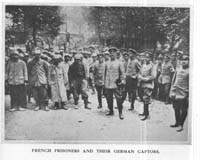 Most importantly, the secretaries did everything in their power to combat the mental suffering that POWs experienced.
Hoffman lamented that in one prison camp where the Association had set up an extensive program, eighty-eight men still
went insane, totally or partially. The primary objective of the YMCA's WPA program was to make sure that these unfortunate
men survived the war, physically, morally, and mentally.29
Most importantly, the secretaries did everything in their power to combat the mental suffering that POWs experienced.
Hoffman lamented that in one prison camp where the Association had set up an extensive program, eighty-eight men still
went insane, totally or partially. The primary objective of the YMCA's WPA program was to make sure that these unfortunate
men survived the war, physically, morally, and mentally.29
31
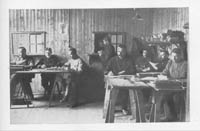 One way to improve the chances of prisoner survival was for their families and government authorities to send money
directly to the POWs. With money, prisoners purchased food on the local market to supplement or diversify their meager
diets. Most families were loath to send cash through the mails because they feared the money would not reach their loved
ones. To solve this problem, the American YMCA became an agent for the transmission of money. Because the Association
One way to improve the chances of prisoner survival was for their families and government authorities to send money
directly to the POWs. With money, prisoners purchased food on the local market to supplement or diversify their meager
diets. Most families were loath to send cash through the mails because they feared the money would not reach their loved
ones. To solve this problem, the American YMCA became an agent for the transmission of money. Because the Association
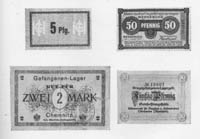 had earned the confidence of the belligerent nations' governments and had both communications with most European capitals
and direct contact with the prisoners, families could send money to the WPA Headquarters in their country and office
staff would cable the cash to the WPA Office in the country where their family member was held. This office would have
the prisoners' current address, and would dispatch a secretary to deliver the money during his visits. Most money was
sent between Germany and Russia, although some cash was transmitted between Germany and France or Britain.
had earned the confidence of the belligerent nations' governments and had both communications with most European capitals
and direct contact with the prisoners, families could send money to the WPA Headquarters in their country and office
staff would cable the cash to the WPA Office in the country where their family member was held. This office would have
the prisoners' current address, and would dispatch a secretary to deliver the money during his visits. Most money was
sent between Germany and Russia, although some cash was transmitted between Germany and France or Britain.
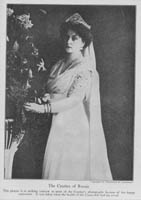 German
families sent several hundreds of thousands of Marks to European Russia and Siberia, in installments of five to one hundred
Marks. Between March 1915 and June 1917, the American YMCA cabled 627,426 Marks, including three hundred thousand Marks from the
German government, to German and Austrian POWs in Russia. From Russia, the American YMCA forwarded 108,000 Marks to
Russian prisoners in Germany. The bulk of this sum was contributed by Tsarina Alexandra Feodorovna (approximately
ninety-eight thousand Marks), and the remainder came from Russian families. The Association also distributed money from the Polish
Commission and other foreign governments.30
German
families sent several hundreds of thousands of Marks to European Russia and Siberia, in installments of five to one hundred
Marks. Between March 1915 and June 1917, the American YMCA cabled 627,426 Marks, including three hundred thousand Marks from the
German government, to German and Austrian POWs in Russia. From Russia, the American YMCA forwarded 108,000 Marks to
Russian prisoners in Germany. The bulk of this sum was contributed by Tsarina Alexandra Feodorovna (approximately
ninety-eight thousand Marks), and the remainder came from Russian families. The Association also distributed money from the Polish
Commission and other foreign governments.30
The American YMCA and the Prisoners' Welfare Council
32
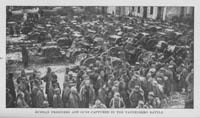 The original American YMCA proposal for providing relief to POWs in belligerent nations rested on the principle that
Association secretaries would provide moral assistance, not physical relief. Red Triangle workers promoted physical
recreation, mental occupations and diversions, and wholesome social relationships. At the Geneva Conference in January
1916, WPA representatives from Allied and Central Power countries agreed that the shipment of food parcels to Central
Europe was outside the scope of the organization. Eventually, worsening conditions in Germany and Austria-Hungary
forced the YMCA to change its mission objectives.31
The original American YMCA proposal for providing relief to POWs in belligerent nations rested on the principle that
Association secretaries would provide moral assistance, not physical relief. Red Triangle workers promoted physical
recreation, mental occupations and diversions, and wholesome social relationships. At the Geneva Conference in January
1916, WPA representatives from Allied and Central Power countries agreed that the shipment of food parcels to Central
Europe was outside the scope of the organization. Eventually, worsening conditions in Germany and Austria-Hungary
forced the YMCA to change its mission objectives.31
33
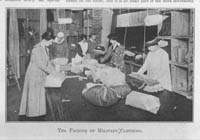 The American YMCA realized by May 1916 that, in spite of all the mental and spiritual comfort they could provide
Allied POWs in Germany, the starvation creeping across the country would result in the deaths of thousands of prisoners
unless steps were taken to alleviate it. The Allied blockade of Germany and the Dual Monarchy was established early in
the war, and included foodstuffs as well as raw materials. Under the Hague Agreements, POWs were to receive the same
rations as troops of the same rank of the captive power.
The American YMCA realized by May 1916 that, in spite of all the mental and spiritual comfort they could provide
Allied POWs in Germany, the starvation creeping across the country would result in the deaths of thousands of prisoners
unless steps were taken to alleviate it. The Allied blockade of Germany and the Dual Monarchy was established early in
the war, and included foodstuffs as well as raw materials. Under the Hague Agreements, POWs were to receive the same
rations as troops of the same rank of the captive power.
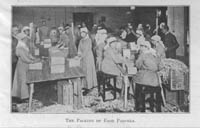 The Germans met this requirement during the early part of the war, but as the effects of the blockade began to affect
the empire, the Germans had to cut back on domestic food allocation. The government set up a food rationing program
and progressively reduced food allowances to POWs as well as the German civilian population. Only front-line troops
and war industry employees received priority rations. As stated earlier, the Red Cross Societies of Britain, France,
and Russia were responsible for the physical well being of their nationals held in Central Power POW camps. In addition,
the Western Allied governments established official relief agencies to ease the suffering of the prisoners in Central
Europe. The Central Committee in London arranged for British prisoners to receive three ten-pound food parcels fortnightly,
as well as supplies of clothing.
The Germans met this requirement during the early part of the war, but as the effects of the blockade began to affect
the empire, the Germans had to cut back on domestic food allocation. The government set up a food rationing program
and progressively reduced food allowances to POWs as well as the German civilian population. Only front-line troops
and war industry employees received priority rations. As stated earlier, the Red Cross Societies of Britain, France,
and Russia were responsible for the physical well being of their nationals held in Central Power POW camps. In addition,
the Western Allied governments established official relief agencies to ease the suffering of the prisoners in Central
Europe. The Central Committee in London arranged for British prisoners to receive three ten-pound food parcels fortnightly,
as well as supplies of clothing.
34
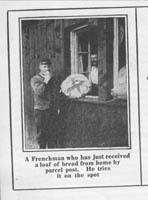 French and Belgian POWs also received biscuits and bread on a regular basis, while French prisoners benefited from
a number of relief agencies established on their behalf. In addition, private charities and individuals provided
food and clothing, especially to Western prisoners. On the other hand, Russian, Serbian, Romanian, and Italian
prisoners suffered grievously from the lack of food supplements.
French and Belgian POWs also received biscuits and bread on a regular basis, while French prisoners benefited from
a number of relief agencies established on their behalf. In addition, private charities and individuals provided
food and clothing, especially to Western prisoners. On the other hand, Russian, Serbian, Romanian, and Italian
prisoners suffered grievously from the lack of food supplements.
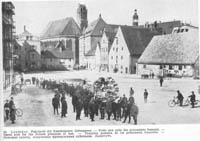 Despite reports in the Allied press to the contrary,
Hoffman believed that the Germans made every effort to make sure that prisoners received their food parcels and prosecuted
guards who stole food from the mails. Despite this aid, the food situation continued to worsen. The Association decided
it was imperative for the organization to extend as much assistance as possible to starving POWs so they could survive
the war.32
Despite reports in the Allied press to the contrary,
Hoffman believed that the Germans made every effort to make sure that prisoners received their food parcels and prosecuted
guards who stole food from the mails. Despite this aid, the food situation continued to worsen. The Association decided
it was imperative for the organization to extend as much assistance as possible to starving POWs so they could survive
the war.32
35
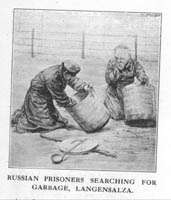 The American YMCA attacked the problem of food shortages at several levels. Individual secretaries supplemented
POW diets wherever possible. As the war dragged on, the supply of food available at reasonable prices fell
dramatically, which prevented secretaries from purchasing additional food. Association field secretaries also worked
closely with camp welfare committees to collect food and clothing for distribution to needy prisoners. At Worms,
Michel and Russian trustees packaged six hundred parcels of articles purchased for their fellow-captives at the suggestion of
the camp commandant. These packets contained handkerchiefs, socks, toothbrushes, and drinking glasses. Russian prisoners
then lined up outside the barrack by companies, and when a trustee read their name from a list, they filed singly into
the building. They then turned in a signed card and received a parcel. The last company was composed primarily of
crippled prisoners who gratefully received their donations. Michel planned to continue to provide packets to needy
prisoners as long as he could obtain supplies.33
The American YMCA attacked the problem of food shortages at several levels. Individual secretaries supplemented
POW diets wherever possible. As the war dragged on, the supply of food available at reasonable prices fell
dramatically, which prevented secretaries from purchasing additional food. Association field secretaries also worked
closely with camp welfare committees to collect food and clothing for distribution to needy prisoners. At Worms,
Michel and Russian trustees packaged six hundred parcels of articles purchased for their fellow-captives at the suggestion of
the camp commandant. These packets contained handkerchiefs, socks, toothbrushes, and drinking glasses. Russian prisoners
then lined up outside the barrack by companies, and when a trustee read their name from a list, they filed singly into
the building. They then turned in a signed card and received a parcel. The last company was composed primarily of
crippled prisoners who gratefully received their donations. Michel planned to continue to provide packets to needy
prisoners as long as he could obtain supplies.33
36
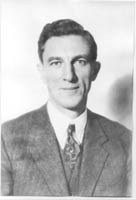 In spite of the efforts of individual WPA field secretaries and camp welfare committees, their resources were
extremely limited. The terrible conditions in Central and Eastern Europe forced the American YMCA to seek relief at
the international level. In May 1916, Harte recognized that the food supply in Germany was becoming insufficient to
meet POW needs. While the quantity of rations met survival levels, the monotony of the prison diet had an adverse impact
on prisoners. The International General Secretary concluded that the YMCA had to do something to supplement POW fare.
Darius A. Davis called a conference in June to discuss this issue in reference to French POWs, and met with a representative
of the German government.
The Association sought to have an American or neutral YMCA secretary supervise the distribution of bread among
French prisoners, which the French government shipped to German prison camps. After several rounds of correspondence,
the Germans accepted Harte to supervise this operation. Mott and the International Committee agreed to finance the
personnel to implement this plan, and the French government promised to pay all traveling expenses for them. The
French requested that the International Committee dispatch eight secretaries to take over the bread distribution
program in Germany. Despite the potential of this arrangement, the plan collapsed when the German Ministry of War
disapproved of several of the proposed secretaries and the ministry failed to take definite action in authorizing
the service. By December 1916, the American secretaries gave up hope of establishing a food distribution service
for French POWs in Germany in conjunction with the French and German governments.34
In spite of the efforts of individual WPA field secretaries and camp welfare committees, their resources were
extremely limited. The terrible conditions in Central and Eastern Europe forced the American YMCA to seek relief at
the international level. In May 1916, Harte recognized that the food supply in Germany was becoming insufficient to
meet POW needs. While the quantity of rations met survival levels, the monotony of the prison diet had an adverse impact
on prisoners. The International General Secretary concluded that the YMCA had to do something to supplement POW fare.
Darius A. Davis called a conference in June to discuss this issue in reference to French POWs, and met with a representative
of the German government.
The Association sought to have an American or neutral YMCA secretary supervise the distribution of bread among
French prisoners, which the French government shipped to German prison camps. After several rounds of correspondence,
the Germans accepted Harte to supervise this operation. Mott and the International Committee agreed to finance the
personnel to implement this plan, and the French government promised to pay all traveling expenses for them. The
French requested that the International Committee dispatch eight secretaries to take over the bread distribution
program in Germany. Despite the potential of this arrangement, the plan collapsed when the German Ministry of War
disapproved of several of the proposed secretaries and the ministry failed to take definite action in authorizing
the service. By December 1916, the American secretaries gave up hope of establishing a food distribution service
for French POWs in Germany in conjunction with the French and German governments.34
37
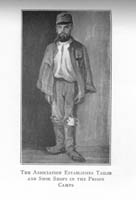 The American YMCA also negotiated with the German government to establish Red Triangle canteens in prison camps. Davis
assured the Germans that the French government would reciprocate by allowing the YMCA to set up canteens for German
prisoners in French prison camps. The Association operated canteens at cost for
The American YMCA also negotiated with the German government to establish Red Triangle canteens in prison camps. Davis
assured the Germans that the French government would reciprocate by allowing the YMCA to set up canteens for German
prisoners in French prison camps. The Association operated canteens at cost for
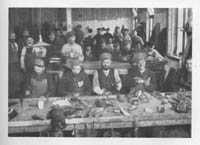 Allied soldiers.
The YMCA provided the initial capital to stock the stores and required canteen managers to charge patrons the cost
of the items purchased plus a small mark-up to support welfare operations. This was not a relief program, in that
goods were not given out freely.
Allied soldiers.
The YMCA provided the initial capital to stock the stores and required canteen managers to charge patrons the cost
of the items purchased plus a small mark-up to support welfare operations. This was not a relief program, in that
goods were not given out freely.
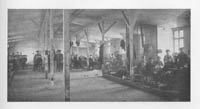 But by selling products at cost, store managers
could purchase additional stock to
keep the service up and running.
The German Ministry of War was very interested in getting the American YMCA to establish canteens in prison camps
in Russia, and put 150,000 Marks at the Association's disposal. German military
But by selling products at cost, store managers
could purchase additional stock to
keep the service up and running.
The German Ministry of War was very interested in getting the American YMCA to establish canteens in prison camps
in Russia, and put 150,000 Marks at the Association's disposal. German military
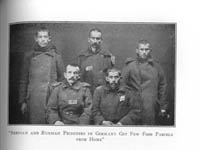 commanders were concerned about the
welfare of their nationals suffering in Siberia and recognized that the YMCA's
canteen system would improve the lot
of these men. Unfortunately, the canteen system was not fully developed in Germany, to the detriment of Allied
prisoners.
Problems with delivering supplies, along with German government reluctance to admit
commanders were concerned about the
welfare of their nationals suffering in Siberia and recognized that the YMCA's
canteen system would improve the lot
of these men. Unfortunately, the canteen system was not fully developed in Germany, to the detriment of Allied
prisoners.
Problems with delivering supplies, along with German government reluctance to admit
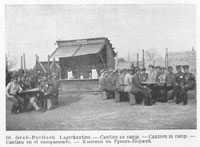 that they did not meet the physical
needs of their POWs, hindered an extensive development of canteens in Germany. Instead, WPA field secretaries helped
prisoners set up food cooperatives on a less formal basis. The WPA sent food to these organizations in German prison
camps, where the welfare committees then sold the food at prices slightly above cost
that they did not meet the physical
needs of their POWs, hindered an extensive development of canteens in Germany. Instead, WPA field secretaries helped
prisoners set up food cooperatives on a less formal basis. The WPA sent food to these organizations in German prison
camps, where the welfare committees then sold the food at prices slightly above cost
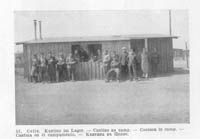 to prisoners who had the resources
make purchases. The welfare committee identified needy POWs who would receive food supplements from the cooperative's
supplies for free. Through this process, the cooperatives could purchase additional food supplies while providing an
important service to poor prisoners who needed additional nourishment to survive.35
to prisoners who had the resources
make purchases. The welfare committee identified needy POWs who would receive food supplements from the cooperative's
supplies for free. Through this process, the cooperatives could purchase additional food supplies while providing an
important service to poor prisoners who needed additional nourishment to survive.35
38
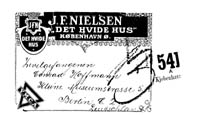 These obstacles did not deter Harte. After his appointment as International General Secretary, he focused on the
problem of increasing the food supplies to prisoners in Germany, the Dual Monarchy, and Russia. In May 1915, Harte
made a special journey to Denmark to procure food parcels for British and Canadian prisoners in Germany and arrange
for regular food deliveries. During his second tour of Russia in the fall of 1915, he mailed the names of Central
Power POWs who did not receive any food parcels from family or friends to New York. He proposed that Americans send
food packages weighing less than ten pounds postage-free to Russia for these unfortunates. He planned to forward
one hundred thousand names of needy prisoners, and relied on the Christian charity of Americans to meet this challenge.
These obstacles did not deter Harte. After his appointment as International General Secretary, he focused on the
problem of increasing the food supplies to prisoners in Germany, the Dual Monarchy, and Russia. In May 1915, Harte
made a special journey to Denmark to procure food parcels for British and Canadian prisoners in Germany and arrange
for regular food deliveries. During his second tour of Russia in the fall of 1915, he mailed the names of Central
Power POWs who did not receive any food parcels from family or friends to New York. He proposed that Americans send
food packages weighing less than ten pounds postage-free to Russia for these unfortunates. He planned to forward
one hundred thousand names of needy prisoners, and relied on the Christian charity of Americans to meet this challenge.
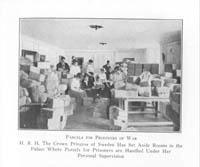 These efforts marked the beginning of Association food parcel distribution to POWs in Central and Eastern Europe.
The primary difficulty was gaining the cooperation of the belligerent governments. Harte's solution was to establish
a food relief committee under the patronage of Crown Princess Margaret of Sweden to supervise the delivery of food
parcels. He found numerous German prison camp commandants who supported this humanitarian proposal. Harte also promoted
the idea of sending raw materials such as cloth for trousers, material for underwear, and leather for shoes directly to
prisoners. The production of these goods would give the POWs a source of employment, help itinerant prisoners learn a
trade, and provide the inmates with goods that they desperately needed. The national YMCA committees in Germany, Austria,
and Russia supported this plan and urged the International Committee to finance the project.36
These efforts marked the beginning of Association food parcel distribution to POWs in Central and Eastern Europe.
The primary difficulty was gaining the cooperation of the belligerent governments. Harte's solution was to establish
a food relief committee under the patronage of Crown Princess Margaret of Sweden to supervise the delivery of food
parcels. He found numerous German prison camp commandants who supported this humanitarian proposal. Harte also promoted
the idea of sending raw materials such as cloth for trousers, material for underwear, and leather for shoes directly to
prisoners. The production of these goods would give the POWs a source of employment, help itinerant prisoners learn a
trade, and provide the inmates with goods that they desperately needed. The national YMCA committees in Germany, Austria,
and Russia supported this plan and urged the International Committee to finance the project.36
39
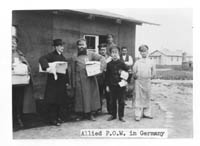 Crown Princess Margaret agreed to act as patroness of the proposed organization, and a system was set up in September
1916. Association secretaries inspected incoming food deliveries at the palace in Stockholm and repacked them for
reshipment and distribution to individual POWs. Diplomatic entanglements delayed the full implementation of the program
until all of the Allied and Central Power governments accepted the plan. The British were the last to approve the proposal,
in February 1917, when the YMCA was able to finally press ahead. By November 1916, Harte had established a WPA Office in
Copenhagen and rented a warehouse for the storage and shipment of food parcels to Germany and Austria-Hungary. An American
YMCA secretary, E. G. Wilson, supervised the food relief operations in Copenhagen.
The warehouse in Denmark could accommodate sixty tons of food in preparation for reshipment to prison camps. The Association
received permission from the Danish government to purchase food from local sources and import provisions from neutral
countries for reshipment to war prisoners. This was a major concession on the part of the Danish government. The Allies had
greatly reduced exports to Denmark as part of the Allied blockade strategy to prevent the reshipment of food and raw
materials to Germany through neutral ports. To support this program, the German government remitted all postal charges
and tariffs on articles imported for the benefit of Allied prisoners.
In addition, the YMCA staff in Copenhagen could forward books, mail, and gifts from friends in small quantities to war
prisoners. The Association maintained a file regarding correspondence with the Russian Red Cross in Petrograd. The YMCA
sent thousands of food parcels from Stockholm and Copenhagen to Germany on a monthly basis. By June 1917, the WPA had
sent twenty-six thousand individual parcels to Germany from Copenhagen. This number steadily grew as Wilson reported that he was
shipping thirty thousand parcels from the Danish warehouse on a monthly basis by the beginning of 1918. Had adequate resupply
networks been available to stock the warehouse in Copenhagen, Wilson estimated that the YMCA could have shipped one hundred thousand
food parcels per month by the end of the war.37
Crown Princess Margaret agreed to act as patroness of the proposed organization, and a system was set up in September
1916. Association secretaries inspected incoming food deliveries at the palace in Stockholm and repacked them for
reshipment and distribution to individual POWs. Diplomatic entanglements delayed the full implementation of the program
until all of the Allied and Central Power governments accepted the plan. The British were the last to approve the proposal,
in February 1917, when the YMCA was able to finally press ahead. By November 1916, Harte had established a WPA Office in
Copenhagen and rented a warehouse for the storage and shipment of food parcels to Germany and Austria-Hungary. An American
YMCA secretary, E. G. Wilson, supervised the food relief operations in Copenhagen.
The warehouse in Denmark could accommodate sixty tons of food in preparation for reshipment to prison camps. The Association
received permission from the Danish government to purchase food from local sources and import provisions from neutral
countries for reshipment to war prisoners. This was a major concession on the part of the Danish government. The Allies had
greatly reduced exports to Denmark as part of the Allied blockade strategy to prevent the reshipment of food and raw
materials to Germany through neutral ports. To support this program, the German government remitted all postal charges
and tariffs on articles imported for the benefit of Allied prisoners.
In addition, the YMCA staff in Copenhagen could forward books, mail, and gifts from friends in small quantities to war
prisoners. The Association maintained a file regarding correspondence with the Russian Red Cross in Petrograd. The YMCA
sent thousands of food parcels from Stockholm and Copenhagen to Germany on a monthly basis. By June 1917, the WPA had
sent twenty-six thousand individual parcels to Germany from Copenhagen. This number steadily grew as Wilson reported that he was
shipping thirty thousand parcels from the Danish warehouse on a monthly basis by the beginning of 1918. Had adequate resupply
networks been available to stock the warehouse in Copenhagen, Wilson estimated that the YMCA could have shipped one hundred thousand
food parcels per month by the end of the war.37
40
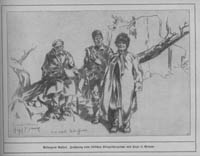 Russian, Serbian, Romanian, Armenian, and Italian prisoners were at the greatest risk of starvation. Their governments
were overwhelmed by the war effort and simply lacked the resources to send food. Political disorganization in these
countries further exacerbated a bad situation. Even before their country was overrun by the Central Power allies, the
Serbian government had forbidden the forwarding of food parcels outside the kingdom's borders. As a result, Slavic and
Italian POWs had to survive solely on German food rations, and they suffered intensely.
Russian, Serbian, Romanian, Armenian, and Italian prisoners were at the greatest risk of starvation. Their governments
were overwhelmed by the war effort and simply lacked the resources to send food. Political disorganization in these
countries further exacerbated a bad situation. Even before their country was overrun by the Central Power allies, the
Serbian government had forbidden the forwarding of food parcels outside the kingdom's borders. As a result, Slavic and
Italian POWs had to survive solely on German food rations, and they suffered intensely.
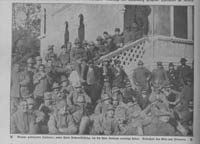 Hoffman reported that thirty to
forty Russian and Romanian POWs were dying daily from starvation in the lazarette at Tuchel by the end of 1917. Lacking
nourishment, the Slavic and Italian POWs became despondent and refused to participate in Association activities. They
could not see the logic in learning how to read or developing a new trade if they would not survive their imprisonment.
In response to pleas from the WPA field secretary to participate, they retorted with the demand, "Give us bread!"
Hoffman reported that thirty to
forty Russian and Romanian POWs were dying daily from starvation in the lazarette at Tuchel by the end of 1917. Lacking
nourishment, the Slavic and Italian POWs became despondent and refused to participate in Association activities. They
could not see the logic in learning how to read or developing a new trade if they would not survive their imprisonment.
In response to pleas from the WPA field secretary to participate, they retorted with the demand, "Give us bread!"
41
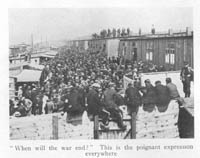 Jacob faced a similar situation in Saxony. He was interrupted during an address to Russian POWs by a prisoner who
complained, "Why does this man come all the way here to talk to us about services, school and music?
Let him look after our stomachs; that's where our needs are now!"38
Jacob responded with a biblical reference: "My friend, you will remember that our Lord once went forty days and forty
nights without food. Was it His stomach that He obeyed first at the end of that time?"39 The American secretary recognized that physical relief was essential to secure the gains
the Association had made among POWs, but religious work was the only solace he could give these men.40
Jacob faced a similar situation in Saxony. He was interrupted during an address to Russian POWs by a prisoner who
complained, "Why does this man come all the way here to talk to us about services, school and music?
Let him look after our stomachs; that's where our needs are now!"38
Jacob responded with a biblical reference: "My friend, you will remember that our Lord once went forty days and forty
nights without food. Was it His stomach that He obeyed first at the end of that time?"39 The American secretary recognized that physical relief was essential to secure the gains
the Association had made among POWs, but religious work was the only solace he could give these men.40
42
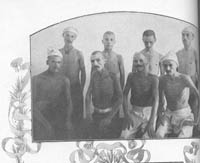 The situation among Italian prisoners in Germany was equally bad. After the Battle of Caporetto in October 1917, the
Italian government was loath to send relief aid to POWs in Germany and Austria-Hungary because they considered many
of the prisoners deserters. By early 1918, the food shortage had resulted in knife fights between Italian POWs over
bowls of soup. Association secretaries noted Italian prisoners scouring garbage dumps for scraps of food; some even
resorted to eating grass.
The situation among Italian prisoners in Germany was equally bad. After the Battle of Caporetto in October 1917, the
Italian government was loath to send relief aid to POWs in Germany and Austria-Hungary because they considered many
of the prisoners deserters. By early 1918, the food shortage had resulted in knife fights between Italian POWs over
bowls of soup. Association secretaries noted Italian prisoners scouring garbage dumps for scraps of food; some even
resorted to eating grass.
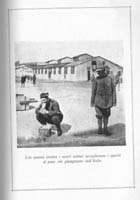 As a result, WPA field secretaries sent the names and addresses of destitute Slavic and Italian prisoners to the WPA
Offices in Copenhagen and Stockholm so that aid could be provided to these unfortunates to help them survive the war.
To ease the plight of Italian prisoners, the International Committee cabled $35,000 to finance food parcel shipments
from Copenhagen. In January 1918, the WPA organizations in Denmark and Sweden shipped 150 tons of food to Central Europe,
but there were too many prisoners for such a small amount of food to make much difference.41
As a result, WPA field secretaries sent the names and addresses of destitute Slavic and Italian prisoners to the WPA
Offices in Copenhagen and Stockholm so that aid could be provided to these unfortunates to help them survive the war.
To ease the plight of Italian prisoners, the International Committee cabled $35,000 to finance food parcel shipments
from Copenhagen. In January 1918, the WPA organizations in Denmark and Sweden shipped 150 tons of food to Central Europe,
but there were too many prisoners for such a small amount of food to make much difference.41
43
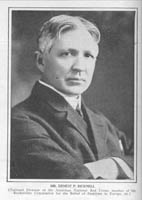 To solve the food shortage problems among POWs in Germany, the American YMCA realized that it was imperative for relief
organizations to formulate a comprehensive plan. The Allied blockade threatened to starve out a large number of Allied
POWs along with undermining Germany's war effort. The International Committee decided in August 1916, after consultations
with members of the Wilson Administration and international lawyers, that a large-scale plan had to be conceived, financed,
negotiated, and implemented.
To solve the food shortage problems among POWs in Germany, the American YMCA realized that it was imperative for relief
organizations to formulate a comprehensive plan. The Allied blockade threatened to starve out a large number of Allied
POWs along with undermining Germany's war effort. The International Committee decided in August 1916, after consultations
with members of the Wilson Administration and international lawyers, that a large-scale plan had to be conceived, financed,
negotiated, and implemented.
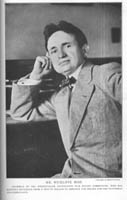 It was clear that the United States was the only country with the resources to provide food on
a large scale. The International Committee helped establish a joint committee, called the Prisoners' Welfare Council,
composed of the American YMCA, the Rockefeller Commission, and the American Red Cross in New York. The American Red Cross
and the Rockefeller Commission had already taken steps to set up a similar food export system to Poland to help alleviate
starvation in the East. Ernest P. Bicknell of the American Red Cross and Wickliffe Rose of the Rockefeller Commission helped
establish the Commission for the Relief of Poland, and these organizations recognized the dangers prisoners faced in Central
and Eastern Europe from starvation. These relief organizations had a great interest in providing physical relief to needy
prisoners.
It was clear that the United States was the only country with the resources to provide food on
a large scale. The International Committee helped establish a joint committee, called the Prisoners' Welfare Council,
composed of the American YMCA, the Rockefeller Commission, and the American Red Cross in New York. The American Red Cross
and the Rockefeller Commission had already taken steps to set up a similar food export system to Poland to help alleviate
starvation in the East. Ernest P. Bicknell of the American Red Cross and Wickliffe Rose of the Rockefeller Commission helped
establish the Commission for the Relief of Poland, and these organizations recognized the dangers prisoners faced in Central
and Eastern Europe from starvation. These relief organizations had a great interest in providing physical relief to needy
prisoners.
44
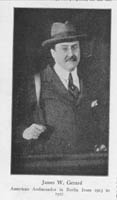 The Prisoners' Welfare Council consisted of four members: a chairman and a representative from each of the three major
social welfare organizations. The committee members asked Mott to serve as the council's chairman, and the Executive
Committee selected Harte to serve as the American YMCA's representative. The American YMCA would not have to put up any
money for this program because the Rockefeller Foundation agreed to finance the start-up and overhead expenses, and the
belligerent governments were willing to provide the operating funds. According to Ambassador James W. Gerard, the Rockefeller
Foundation promised to pay $300,000 for the initial costs and agreed to place another $200,000 toward a general fund of $1
million to be used as working capital to buy supplies to supplement the diets of war prisoners. The objective of this committee
was to export food, clothing, medical supplies, and blankets from the United States and other neutral nations to Central and
Eastern Europe.42
The Prisoners' Welfare Council consisted of four members: a chairman and a representative from each of the three major
social welfare organizations. The committee members asked Mott to serve as the council's chairman, and the Executive
Committee selected Harte to serve as the American YMCA's representative. The American YMCA would not have to put up any
money for this program because the Rockefeller Foundation agreed to finance the start-up and overhead expenses, and the
belligerent governments were willing to provide the operating funds. According to Ambassador James W. Gerard, the Rockefeller
Foundation promised to pay $300,000 for the initial costs and agreed to place another $200,000 toward a general fund of $1
million to be used as working capital to buy supplies to supplement the diets of war prisoners. The objective of this committee
was to export food, clothing, medical supplies, and blankets from the United States and other neutral nations to Central and
Eastern Europe.42
45
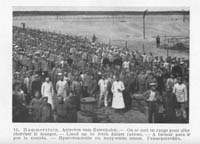 The joint American relief committee then began a long and tedious series of negotiations between neutral and belligerent
governments to put their plan into action. Harte conducted most of the negotiations in Europe and had to surmount several
significant obstacles. He had to secure a pledge from the German government that all food shipped as part of this plan would
go only to Allied prisoners. In addition, the Germans had to promise to maintain their current level of rations for POWs
and not reduce food allocations as supplemental food arrived. These conditions were essential to persuade the Allies to
accept the plan. Without these guarantees, the Germans could have used POW relief shipments to circumvent the blockade.
Neutral governments also had to receive assurances that POW food shipments would not affect the import quotas established
by the Allies as part of the blockade. By April 1917, the negotiations appeared to have reached a successful conclusion.
The German government had agreed to British conditions in writing, and the American, Danish, Swedish, and Dutch governments
decided to support the program. At the last minute, however, the scheme collapsed due to two crucial factors. The British
Admiralty pressed the government not to weaken the blockade against the Central Powers, even if it meant starvation for a
large number of Allied prisoners. As a result, the British government failed to sanction the final scheme, and the blockade
remained in full force. More importantly, the entry of the United States into the war eliminated any available space for
foodstuffs for POWs aboard American merchant ships. The U.S. government threw all of its resources behind the Allied cause,
including surplus food supplies. Without access to American foodstuffs, and with no partial lifting of Allied blockade
regulations, the European neutrals could not meet POW relief demands.43
The joint American relief committee then began a long and tedious series of negotiations between neutral and belligerent
governments to put their plan into action. Harte conducted most of the negotiations in Europe and had to surmount several
significant obstacles. He had to secure a pledge from the German government that all food shipped as part of this plan would
go only to Allied prisoners. In addition, the Germans had to promise to maintain their current level of rations for POWs
and not reduce food allocations as supplemental food arrived. These conditions were essential to persuade the Allies to
accept the plan. Without these guarantees, the Germans could have used POW relief shipments to circumvent the blockade.
Neutral governments also had to receive assurances that POW food shipments would not affect the import quotas established
by the Allies as part of the blockade. By April 1917, the negotiations appeared to have reached a successful conclusion.
The German government had agreed to British conditions in writing, and the American, Danish, Swedish, and Dutch governments
decided to support the program. At the last minute, however, the scheme collapsed due to two crucial factors. The British
Admiralty pressed the government not to weaken the blockade against the Central Powers, even if it meant starvation for a
large number of Allied prisoners. As a result, the British government failed to sanction the final scheme, and the blockade
remained in full force. More importantly, the entry of the United States into the war eliminated any available space for
foodstuffs for POWs aboard American merchant ships. The U.S. government threw all of its resources behind the Allied cause,
including surplus food supplies. Without access to American foodstuffs, and with no partial lifting of Allied blockade
regulations, the European neutrals could not meet POW relief demands.43
46
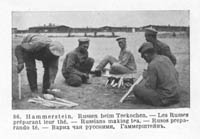 The collapse of the Prisoners' Welfare Council's relief plan was a major blow to the WPA field secretaries. They had hoped
to renew interest in Association programs among POWs by meeting their basic needs for sustenance. The failure of the plan
had an even greater impact on Slavic prisoners. At one prison camp in Germany, Russian POWs had ordered eighty thousand Marks worth
of food from the YMCA to meet the prisoners' needs for one month in anticipation of the plan going into effect.
WPA field secretaries had to return their money because the food supplies were simply unavailable. While Harte continued to
negotiate with belligerent governments throughout the course of the war, the continued lack of American shipping space made
the plan unfeasible. As a result, Association secretaries had to continue to muddle through by purchasing local food supplies
whenever possible and relying on scanty food parcel shipments from Copenhagen and Stockholm to help needy prisoners survive
the war.44
The collapse of the Prisoners' Welfare Council's relief plan was a major blow to the WPA field secretaries. They had hoped
to renew interest in Association programs among POWs by meeting their basic needs for sustenance. The failure of the plan
had an even greater impact on Slavic prisoners. At one prison camp in Germany, Russian POWs had ordered eighty thousand Marks worth
of food from the YMCA to meet the prisoners' needs for one month in anticipation of the plan going into effect.
WPA field secretaries had to return their money because the food supplies were simply unavailable. While Harte continued to
negotiate with belligerent governments throughout the course of the war, the continued lack of American shipping space made
the plan unfeasible. As a result, Association secretaries had to continue to muddle through by purchasing local food supplies
whenever possible and relying on scanty food parcel shipments from Copenhagen and Stockholm to help needy prisoners survive
the war.44
47
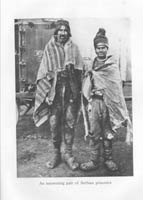 Over the course of three years, the American YMCA's primary objective in Germany changed dramatically. Though originally sent to address
the symptoms of "barbed-wire disease," as physical conditions deteriorated terribly in prison camps due to the Allied blockade, secretaries
shifted the focus of their work. Their first efforts focused on making incarceration profitable for prisoners from a social and economic
perspective, but eventually altered to striving to keep POWs in good enough physical shape to simply survive the war.
Over the course of three years, the American YMCA's primary objective in Germany changed dramatically. Though originally sent to address
the symptoms of "barbed-wire disease," as physical conditions deteriorated terribly in prison camps due to the Allied blockade, secretaries
shifted the focus of their work. Their first efforts focused on making incarceration profitable for prisoners from a social and economic
perspective, but eventually altered to striving to keep POWs in good enough physical shape to simply survive the war.
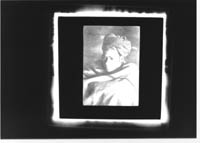 The Red Triangle
workers were about to face yet another major change in their objectives as Germany decided to renew unrestricted submarine warfare around
the British Isles in January 1917. In the meantime, American secretaries set up similar WPA operations in Austria-Hungary. The next chapter
will examine the Red Triangle relief work for Allied POWs in the Dual Monarchy.
The Red Triangle
workers were about to face yet another major change in their objectives as Germany decided to renew unrestricted submarine warfare around
the British Isles in January 1917. In the meantime, American secretaries set up similar WPA operations in Austria-Hungary. The next chapter
will examine the Red Triangle relief work for Allied POWs in the Dual Monarchy.
Notes:
Note 1: Julius F. Hecker, "Copies of Letters Regarding Prisoner of War Work, September 1917," circa September 1917. Armed Services Records Box AS-21. Box X673.6: "World War 1914-1918, Prisoners of War (A)." Kautz Family YMCA Archives, University of Minnesota Libraries, Minneapolis, MN; E.O. Jacob, "Report of E.O. Jacob: For the Year Ending September 30, 1917," 30 September 1917, 5-6. Armed Services Records Box AS-20. Box 673.6: "Reports, Clippings, Publications, 1915-1921: World War #1: Prisoners of War." Folder E: "Prisoners of War, YMCA Work for Germany." Kautz Family YMCA Archives, University of Minnesota Libraries, Minneapolis, MN. back
Note 2: J. Gustav White, Educational Activities for War Prisoners: A Manual (Geneva: Educational-Department War Prisoners' Aid, World Committee of the Young Men's Christian Associations," circa 1917, 1-55. Armed Services Records Box AS-21. Box X673.6: "World War 1914-1918, Prisoners of War (A)." Kautz Family YMCA Archives, University of Minnesota Libraries, Minneapolis, MN; General Report, no date, 6-7 and 12. World's Alliance Box X391.2: "War Prisoners' Aid YMCA, 1914-1915; POW Camps in Germany and France; War Guilt Question." Section 43: "Germany." Folder X391.2 (43): "War Prisoners' Aid in Germany, 1914-1918." World's Alliance of YMCAs Archives, Geneva; and Deutsches Kommitee der Kriegsgefangenenhilfe der Christlichen Vereine jünger Männer (Munich: Knorr und Sirth, October 1916), 1-9. World's Alliance Box X391.2: "War Prisoners' Aid YMCA, 1914-1915; POW Camps in Germany and France; War Guilt Question." Section 43: "Germany." Publications. World's Alliance of YMCAs Archives, Geneva. back
Note 3: Conrad Hoffman, "Prisoners of War in Germany: Letters from Conrad Hoffman," For the Millions of Men Now Under Arms 1 (31 January 1916): 39; Gerhard Niedermeyer, "Extract from Letter of Dr. Niedermeyer to Dr. Mott," For the Millions of Men Now Under Arms 1 (31 January 1916): 35; Conrad F. French, "Letters of Thanks," For the Millions of Men Now Under Arms 2 (1 November 1916): 44; "A Prisoner-of-War Library in a German Prison Camp," For the Millions of Men Now Under Arms 2 (1 November 1916): 40B; Carl Michel, "Study and Play at Darmstadt," For the Millions of Men Now Under Arms 2 (1 February 1917): 48; Executive of the World's Committee of Y.M.C.A.s, "World's Committee of Young Men's Christian Associations, Plenary Meeting of 1920 at Geneva: Report of the Executive for the Period July 1914 to June 1920," The Sphere 2:3 (1921): 196-98; E. O. Jacob, "Report of E. O. Jacob: For the Year Ending September 30, 1917," 30 September 1917, 8. Armed Services Records Box AS-20. Box 673.6: "Reports, Clippings, Publications, 1915-1921: World War #1: Prisoners of War." Folder E: "Prisoners of War, YMCA Work for Germany." Kautz Family YMCA Archives, University of Minnesota Libraries, Minneapolis, MN; J. Gustav White, Educational Activities for War Prisoners: A Manual (Geneva: Educational-Department War Prisoners' Aid, World Committee of the Young Men's Christian Associations," circa 1917, 1-55. Armed Services Records Box AS-21. Box X673.6: "World War 1914-1918, Prisoners of War (A)." Kautz Family YMCA Archives, University of Minnesota Libraries, Minneapolis, MN;; General Report, no date, 6-7 and 12. World's Alliance Box X391.2: "War Prisoners' Aid YMCA, 1914-1915; POW Camps in Germany and France; War Guilt Question." Section 43: "Germany." Folder X391.2 (43): "War Prisoners' Aid in Germany, 1914-1918." World's Alliance of YMCAs Archives, Geneva; Deutsches Kommitee der Kriegsgefangenenhilfe der Christlichen Vereine jünger Männer, 1-9; and Carl P. Dennett, The Prisoners of the Great War: Authoritative Statement of Conditions In the Prison Camps of Germany (Boston, MA: Houghton Mifflin, 1919), 116 and 154-55. back
Note 4: These libraries were portable, shipped in wooden boxes, and consisted of a wide range of books. The development of small libraries was an important YMCA innovation, and prisoners could exchange these libraries for another set of books after a period of time. back
Note 5: Copies of The Messenger were also published in German and Bulgarian and distributed in Allied POW camps. Conrad Hoffman, Jr., In the Prison Camps of Germany: A Narrative of "Y" Service among Prisoners of War (New York: Association Press, 1920), 76-77, 79, and 275-78; J. Gustav White, "Prisoners-of-War at School: 'Next to Bread, We Need Books,' Say Prisoners-of-War Who Go to School, Make Toys, and Learn Trades," Association Men 43 (September 1917): 16; William Howard Taft, Frederick Harris, Frederic Houston Kent, and William J. Newlin, eds., Service with Fighting Men: An Account of the Work of the American Young Men's Christian Association in the World War, 2 vols. (New York: Association Press, 1922), 2:298-99; Theodore Geisendorf and Paul Des Gouttes, Pour les prisonniers de guerre: des Vivres certes! Mais des Livres aussi (Geneva: Sonor, S.A., 1918), 1-8. Federation des Oeuvres d'Envoise de Livres aux Prisonniers, Oeuvre des Bibliotheques Circulantes pour les Prisonniers isoles (Paris: Ravilly, n.d.), 1-4. Theodore Geisendorf, Comite Universel des U.C.J.G., Rapport sur l'Organisation a Paris d'un Comite port l'Envoi en Allemagne de Livres aux Prisonniers de Guerre isolades (Geneva: n.d.), 1-5. World's Alliance Box X391.2: "War Prisoners' Aid Y.M.C.A., 1914-1918: POW Camps in Germany and France." Section 43: "Germany." Publications. World's Alliance of YMCAs Archives, Geneva; Executive of the World's Committee of Y.M.C.A.'s, "World's Committee of Young Men's Christian Associations, Plenary Meeting of 1920 at Geneva: Report of the Executive for the Period July 1914 to June 1920," The Sphere 2:3 (1921): 197; The Wooden City: A Journal for British Prisoners of War, Göttingen, Germany, several issues. Le Camp de Göttingen: Les Manuscripts non inseres ne sont pas rendus, Göttingen, Germany, several issues. Box X673.6: "Reports, Clippings, Publications, 1915-1921: World War #1: Prisoners of War." Folder E: "Prisoners of War, YMCA Work for Germany." Kautz Family YMCA Archives, University of Minnesota Libraries, Minneapolis, MN In Ruhleben Camp, 1915, issues Number 1 (6 June 1915) through Number 10 (Christmas 1915), Ruhleben, Germany; Olin D. Wannamaker, For the Six Million Prisoners: The Welfare Work of the YMCA in the Prison Camps of Ten Nations during World War I (September 1921), 139-40; and Dennett, Prisoners of the Great War, 53. back
Note 6: Gerhard Niedermeyer, "Extract from Letter of Dr. Niedermeyer to Dr. Mott," For the Millions of Men Now Under Arms 1 (31 January 1916): 35; and Conrad Hoffman, "Germany: For Soldiers: How Work for Soldiers Is Administered," For the Millions of Men Now Under Arms 1 (31 July 1916): 43-44. back
Note 7: Carl Michel, "Study and Play at Darmstadt," 48; Hoffman, In the Prison Camps of Germany, 76-78; International Committee of the Young Men's Christian Associations, Year Book of the Young Men's Christian Associations of North America, May 1, 1916 to April 30, 1917 (New York: Association Press, 1917), 29; J. Gustav White, "Prisoners-of-War at School: 'Next to Bread, We Need Books,' Say Prisoners-of-War Who Go to School, Make Toys, and Learn Trades," Association Men, 43 (September 1917), p. 16; E. O. Jacob, "Report of E.O. Jacob: For the Year Ending September 30, 1917," 7. Armed Services Records Box AS-20. Box 673.6: "Reports, Clippings, Publications, 1915-1921: World War #1: Prisoners of War." Folder E: "Prisoners of War, YMCA Work for Germany." YMCA's of the USA Archives, Minneapolis, MN; and Dennett, Prisoners of the Great War, 53. back
Note 8: M. S. Princhard, "From a British Soldier in a German Prison," For the Millions of Men Now Under Arms 2 (1 November 1917): 47; James E. Sprunger, "Notes from Camps Visited by J. E. Sprunger," For the Millions of Men Now Under Arms 1 (15 April 1916): 45; A. H. Dowling, "Letters of Thanks," For the Millions of Men Now Under Arms 2 (1 November 1917): 45; Alfred Lowry, Jr., "Needs of Prisoners in Bavaria," For the Millions of Men Now Under Arms 2 (1 June 1917): 47; Conrad Hoffman, "Prisoners," For the Millions of Men Now Under Arms 2 (10 June 1918): 47; Hoffman, In the Prison Camps of Germany, 79-80; E. O. Jacob, "Report of E.O. Jacob: For the Year Ending September 30, 1917," 7; Armed Services Records Box AS-20. Box 673.6: "Reports, Clippings, Publications, 1915-1921: World War #1: Prisoners of War." Folder E: "Prisoners of War, YMCA Work for Germany." YMCA's of the USA Archives, Minneapolis, MN; and Wannamaker, Six Million, 140-41. back
Note 9: William H. Lawall, "From the Letters of Secretaries," For the Millions of Men Now Under Arms 2 (1 November 1916): 43; "Fifteen Hundred Boys Captured with Other Prisoners of War Have Been Sought Out and Placed under the Care of the Association," For the Millions of Men Now Under Arms 2 (1 June 1917): 26B; J. Gustav White, "Prisoners-of-War at School: 'Next to Bread, We Need Books,' Say Prisoners-of-War Who Go to School, Make Toys, and Learn Trades," Association Men, 43 (September 1917), p. 17; and International Committee of the Young Men's Christian Associations, Year Book of the Young Men's Christian Associations of North America, May 1, 1916 to April 30, 1917, 30. back
Note 10: William H. Lawall, "In Prison, Ye Visited Me," For the Millions of Men Now Under Arms 1 (31 July 1916): 47; William H. Lawall, "From the Letters of Secretaries," For the Millions of Men Now Under Arms, 2 (November 1, 1916), p. 43; "New Limbs for Old: Prisoners Encouraged to Play Volley Ball or Taught to Use Suitable Apparatus Often Recover the Use of Paralyzed Limbs," For the Millions of Men Now Under Arms 2 (1 February 1917): 26A; J. Gustav White, "Prisoners-of-War at School: 'Next to Bread, We Need Books,' Say Prisoners-of-War Who Go to School, Make Toys, and Learn Trades," Association Men, 43 (September 1917), p. 17; and "Extract from Letters of Three of the New Secretaries," no date, p-r. Armed Services Records Box AS-20. Box X673.6: "Reports, Clippings, Publications, 1915-1921: World War #1: Prisoners of War." Folder E: "Prisoners of War, YMCA Work for Germany." Kautz Family YMCA Archives, University of Minnesota Libraries, Minneapolis, MN. back
Note 11: Conrad Hoffman, "In Prison, Ye Visited Me," For the Millions of Men Now Under Arms 1 (15 April 1916): 45. back
Note 12: Conrad Hoffman, "In Prison, Ye Visited Me," 44-45; A. H. Dowling, "Letters of Thanks," For the Millions of Men Now Under Arms 2 (1 November 1916): 45; E. O. Jacob, "Working Parties Change Conditions," For the Millions of Men Now Under Arms 2 (1 June 1917), 49; Alfred Lowry, Jr., "Needs of Prisoners in Bavaria," For the Millions of Men Now Under Arms 2 (1 June 1917), 47; E. O. Jacob, "Report of E.O. Jacob: For the Year Ending September 30, 1917," 11-13. Liederbuch Kriegsgefangenen-Hilfe: Ich bin gefangen gewesen und ihr habt mich besucht; Hymn Book War-Prisoners' Aid: I was in prison and Ye came unto me; Cantiques L'aide des prisonniers de guerre: J'etais en prison et vous etes venus vers moi (Barmen, Germany: Westdeutscher Jünglingsbund, Barmen Universität, 1914/15); "The Million Testament Call," Philadelphia Sunday School Times (10 July 1915). Armed Services Records Box AS-20. Box 673.6: "Reports, Clippings, Publications, 1915-1921: World War #1: Prisoners of War." Folder E: "Prisoners of War, YMCA Work for Germany." YMCAs of the U.S. Archives, Minneapolis, MN; General Report, no date, 10. World's Alliance Box X391.2: "War Prisoners' Aid YMCA, 1914-1915; POW Camps in Germany and France; War Guilt Question." Section 43: "Germany." Folder X391.2 (43): "War Prisoners' Aid in Germany, 1914-1918." World's Alliance of YMCAs Archives, Geneva; International Committee of the Young Men's Christian Associations, Year Book of the Young Men's Christian Associations of North America, May 1, 1916 to April 30, 1917 (New York: Association Press, 1917), 29; and Taft, Harris, Kent, and Newlin, Service with Fighting Men, 2:299. back
Note 13: John R. Mott to Christian Phildius, 24 July 1915, New York, 1. World's Alliance Box X391.2: "War Prisoners' Aid Y.M.C.A., 1914-1915; POW Camps in Germany and France; War Guilt Question." Section 43: "Germany." Folder: "War Prisoners' Aid in Germany: Miscellaneous." World's Alliance of YMCAs Archives, Geneva; E. O. Jacob, "Report of E. O. Jacob: For the Year Ending September 30, 1917," 11-13. Armed Services Records Box AS-20. Box 673.6: "Reports, Clippings, Publications, 1915-1921: World War #1: Prisoners of War." Folder E: "Prisoners of War, YMCA Work for Germany." YMCA's of the USA Archives, Minneapolis, MN; and Taft, Harris, Kent, and Newlin, Service with Fighting Men, 2:299. back
Note 14: William H. Lawall, "In Prison, Ye Visited Me," For the Millions of Men Now Under Arms, 1 (July 31, 1916), p. 46; Hoffman, In the Prison Camps of Germany, 77-78; "Choir and Greek Priest Holding Service According to the Rites of the Greek Church in an Association Building," For the Millions of Men Now Under Arms 2 (1 November 1916): 40B; E. O. Jacob, "Report of E. O. Jacob: For the Year Ending September 30, 1917," 12-13. Armed Services Records Box AS-20. Box 673.6: "Reports, Clippings, Publications, 1915-1921: World War #1: Prisoners of War." Folder E: "Prisoners of War, YMCA Work for Germany." YMCA's of the USA Archives, Minneapolis, MN; Taft, Harris, Kent, and Newlin, Service with Fighting Men, 2:299-300; and Wannamaker, Six Million, 140. back
Note 15: Conrad Hoffman, "Good Will of Outside Friends Finds Expression," For the Millions of Men Now Under Arms 2 (1 June 1917): 44; Carl Michel, "Study and Play at Darmstadt," 49; E. O. Jacob, "Report of E. O. Jacob: For the Year Ending September 30, 1917," 13; Hoffman, In the Prison Camps of Germany, 91; Taft, Harris, Kent, and Newlin, Service with Fighting Men, 2:301; and Wannamaker, Six Million, 141. back
Note 16: Conrad Hoffman, "Good Will of Outside Friends Finds Expression," 45; Conrad Hoffman, "Prisoners," For the Millions of Men Now Under Arms, 2 (June 10, 1918), p. 47; and Hoffman, In the Prison Camps of Germany, 91-92. back
Note 17: Conrad Hoffman, "Good Will of Outside Friends Finds Expression," 45-46; Conrad Hoffman, "Prisoners," 47; Wojin Nastasijewitch, "Appreciation of Serbian Committee," For the Millions of Men Now Under Arms 2 (1 June 1917): 47; "Well Beloved Christmas Symbols Brought Home Near to Many in the Prisoners-of-War Camps," For the Millions of Men Now Under Arms 2 (1 June 1917): 42A; Hoffman, In the Prison Camps of Germany, 92-95 and 127-28; and Taft, Harris, Kent, and Newlin, Service with Fighting Men, 2:301. back
Note 18: Conrad Hoffman, "Good Will of Outside Friends Finds Expression," For the Millions of Men Now Under Arms, 2 (June 1, 1917), p. 45. back
Note 19: Conrad Hoffman, "Good Will of Outside Friends Finds Expression," For the Millions of Men Now Under Arms, 2 (June 1, 1917), pp. 45-46; and Hoffman, In the Prison Camps of Germany, 92. back
Note 20: Conrad Hoffman, "Prisoners," For the Millions of Men Now Under Arms, 2 (June 10, 1910), p. 48. back
Note 21: Conrad Hoffman, "Good Will of Outside Friends Finds Expression," For the Millions of Men Now Under Arms, 2 (June 1, 1917), p. 46; and Hoffman, In the Prison Camps of Germany, 94. back
Note 22: Conrad Hoffman, "Prisoners," For the Millions of Men Now Under Arms, 2 (June 10, 1918), p. 47; and Hoffman, 1920, p. 95. back
Note 23: William H. Lawall, "In Prison, Ye Visited Me47; Carl Michel, "Study and Play at Darmstadt," 48-49; Hoffman, In the Prison Camps of Germany, 69; Conrad Hoffman to Thomas C. Hall, no date, 1-2. General Report, no date, 14-16 and 24. World's Alliance Box X391.2: "War Prisoners' Aid YMCA, 1914-1915; POW Camps in Germany and France; War Guilt Question." Section 43: "Germany." Folder X391.2 (43): "War Prisoners' Aid in Germany, 1914-1918." World's Alliance of YMCAs Archives, Geneva; Archibald C. Harte, "With the Prisoners of War" in In the Camps, Trenches, and Prisons of Asia, Africa, and Europe (Oxford: Frederick Hall, Printer to the University, 1916), 36. Armed Services Box AS-20. Box X673.6: "Reports: 1916-1921: World War #1: Allied Armies and Prisoners of War." Kautz Family YMCA Archives, University of Minnesota Libraries, Minneapolis, MN; and "Extract from Letters of Three of the New Secretaries," no date, r-u. YMCA Secretary to Robert Rux, 8 September 1915, 1. YMCA Secretary to George M. Day, 8 September 1915, 1. Robert Rux to the International Society of Christianity, New York (American), 12 August 1915, 1-2. Armed Services Records Box AS-20. Box X673.6: "Reports, Clippings, Publications, 1915-1921: World War #1: Prisoners of War." Folder E: "Prisoners of War, YMCA Work for Germany." Kautz Family YMCA Archives, University of Minnesota Libraries, Minneapolis, MN. back
Note 24: James E. Sprunger, "Notes from Camps Visited by J. E. Sprunger," 45; Carl T. Michel, "Extracts from Letters of Three of the New Secretaries," For the Millions of Men Now Under Arms 1 (31 July 1916): 45; Claus Olandt, "The Officers' Camp at Werl," For the Millions of Men Now Under Arms 1 (31 July 1916): 46; Carl T. Michel, "From the Letters of Some Secretaries," For the Millions of Men Now Under Arms 2 (1 November 1916): 43; C. J. Willis, "Letters of Thanks," For the Millions of Men Now Under Arms 2 (1 November 1916): 44; C. Williams, "Letters of Thanks," For the Millions of Men Now Under Arms 2 (1 November 1916), 44-45; M. Goble, "Letters of Thanks," For the Millions of Men Now Under Arms, 2 (1 November 1916): 45; A. H. Dowling, "Letters of Thanks," For the Millions of Men Now Under Arms 2 (1 November 1916): 45; Carl T. Michel, "Study and Play at Darmstadt," 48; E. O. Jacob, "Working Parties Change Conditions," 49; Alfred Lowry, Jr., "Needs of Prisoners in Bavaria," 47; General Report, no date, 8. World's Alliance Box X391.2: "War Prisoners' Aid YMCA, 1914-1915; POW Camps in Germany and France; War Guilt Question." Section 43: "Germany." Folder X391.2 (43): "War Prisoners' Aid in Germany, 1914-1918." World's Alliance of YMCAs Archives, Geneva; E. O. Jacob, "Report of E.O. Jacob: For the Year Ending September 30, 1917," 9; "Extract from Letters of Three of the New Secretaries," no date, l. "War Prison Camps in Europe: Scenes of Y.M.C.A. Work," Mew York Daily News (30 October 1915), 5. Armed Services Records Box AS-20. Box 673.6: "Reports, Clippings, Publications, 1915-1921: World War #1: Prisoners of War." Folder E: "Prisoners of War, YMCA Work for Germany." Kautz Family YMCA Archives, University of Minnesota Libraries, Minneapolis, MN; International Committee of the Young Men's Christian Associations, Year Book of the Young Men's Christian Associations of North America, May 1, 1916 to April 30, 1917, 29; Taft, Harris, Kent, and Newlin, Service with Fighting Men, 2:299; Wannamaker, Six Million, 138-140; and Dennett, Prisoners of the Great War, 154. back
Note 25: F. Pourtales, "The Association Is the Channel for Much Relief Work," For the Millions of Men Now Under Arms 2 (1 November 1916): 41; Carl T. Michel, "Study and Play at Darmstadt," For the Millions of Men Now Under Arms, 2 (February 1, 1917), p. 48; Louis Wolferz, "Germany: For Prisoners of War," For the Millions of Men Now Under Arms 2 (1 June 1917): 41; J. Gustav White, "Prisoners-of-War at School: 'Next to Bread, We Need Books,' Say Prisoners-of-War Who Go to School, Make Toys, and Learn Trades," Association Men, 43 (September 1917), p. 17; Hoffman, In the Prison Camps of Germany, 91; E. O. Jacob, "Report of E. O. Jacob: For the Year Ending September 30, 1917," 9. Armed Services Records Box AS-20. Box 673.6: "Reports, Clippings, Publications, 1915-1921: World War #1: Prisoners of War." Folder E: "Prisoners of War, YMCA Work for Germany." YMCA's of the USA Archives, Minneapolis, MN; General Report, no date, 8-9 and 13. World's Alliance Box X391.2: "War Prisoners' Aid Y.M.C.A., 1914-1915; POW Camps in Germany and France; War Guilt Question." Section 43: "Germany." Folder X391.2 (43): "War Prisoners' Aid in Germany, 1914-1918." World's Alliance of YMCAs Archives, Geneva; Archibald C. Harte, "With the Prisoners of War," 36-37. Armed Services Box AS-20. Box X673.6: "Reports: 1916-1921: World War #1: Allied Armies and Prisoners of War." YMCA's of the USA Archives, Minneapolis, MN; International Committee of the Young Men's Christian Associations, Year Book of the Young Men's Christian Associations of North America, May 1, 1916 to April 30, 1917, 29; and Wannamaker, Six Million, 138-40. back
Note 26: J. E. Sprunger, "Notes from Camps Visited by J.E. Sprunger," For the Millions of Men Now Under Arms, 1 (April 15, 1916), p. 46; Louis Wolferz, "Germany: For Prisoners of War," For the Millions of Men Now Under Arms, 2 (June 1, 1917), p. 41; E. O. Jacob, "Working Parties Change Conditions," For the Millions of Men Now Under Arms, 2 (June 1, 1917), p. 49; E. O. Jacob, "Report of E.O. Jacob: For the Year Ending September 30, 1917," 11. Armed Services Records Box AS-20. Box 673.6: "Reports, Clippings, Publications, 1915-1921: World War #1: Prisoners of War." Folder E: "Prisoners of War, YMCA Work for Germany." YMCA's of the USA Archives, Minneapolis, MN; and Wannamaker, Six Million, 140. back
Note 27: Carl T. Michel, "Study and Play at Darmstadt," For the Millions of Men Now Under Arms, 2 (February 1, 1917), p. 48; E. O. Jacob, "Working Parties Change Conditions," For the Millions of Men Now Under Arms, 2 (June 1, 1917), 49; Alfred Lowry, Jr., "Needs of Prisoners in Bavaria," For the Millions of Men Now Under Arms, 2 (June 1, 1917), p. 47; General Report, no date, 8 and 11. World's Alliance Box X391.2: "War Prisoners' Aid Y.M.C.A., 1914-1915; POW Camps in Germany and France; War Guilt Question." Section 43: "Germany." Folder X391.2 (43): "War Prisoners' Aid in Germany, 1914-1918." World's Alliance of YMCAs Archives, Geneva; E. O. Jacob, "Report of E. O. Jacob: For the Year Ending September 30, 1917," 12. Armed Services Records Box AS-20. Box 673.6: "Reports, Clippings, Publications, 1915-1921: World War #1: Prisoners of War." Folder E: "Prisoners of War, YMCA Work for Germany." YMCA's of the USA Archives, Minneapolis, MN; Wannamaker, Six Million, 140; and Dennett, Prisoners of the Great War, 154. back
Note 28: Claus Olandt, "The Officers' Camp at Werl," 45-46; E. O. Jacob, "Working Parties Change Conditions," 49; Alfred Lowry, Jr., "Needs of Prisoners in Bavaria," 47; General Report, no date, 8 and 13. World's Alliance Box X391.2: "War Prisoners' Aid Y.M.C.A., 1914-1915; POW Camps in Germany and France; War Guilt Question." Section 43: "Germany." Folder X391.2 (43): "War Prisoners' Aid in Germany, 1914-1918." World's Alliance of YMCAs Archives, Geneva; E. O. Jacob, "Report of E. O. Jacob: For the Year Ending September 30, 1917," 11. "Extract from Letters of Three of the New Secretaries," no date, m-n. Armed Services Records Box AS-20. Box 673.6: "Reports, Clippings, Publications, 1915-1921: World War #1: Prisoners of War." Folder E: "Prisoners of War, YMCA Work for Germany." YMCA's of the USA Archives, Minneapolis, MN; Wannamaker, Six Million, 140; and Dennett, Prisoners of the Great War, 52-53, 117, and 155. back
Note 29: Conrad Hoffman, "A Senior Secretary's Report," For the Millions of Men Now Under Arms 1 (31 July 1916): 45; Carl T. Michel, "Extracts from Letters of Three of the New Secretaries," For the Millions of Men Now Under Arms, 1 (July 31, 1916), p. 45; Claus Olandt, "From the Letters of Some Secretaries," For the Millions of Men Now Under Arms 2 (1 November 1916): 43; William H. Lawall, "From the Letters of Secretaries," For the Millions of Men Now Under Arms 2 (1 November 1916): 44; Carl T. Michel, "Study and Play at Darmstadt," For the Millions of Men Now Under Arms, 2 (February 1, 1917), p. 49; Conrad Hoffman, "Good Will of Outside Friends Finds Expression," For the Millions of Men Now Under Arms, 2 (June 1, 1917), p. 45; General Report, no date, 7. World's Alliance Box X391.2: "War Prisoners' Aid Y.M.C.A., 1914-1915; POW Camps in Germany and France; War Guilt Question." Section 43: "Germany." Folder X391.2 (43): "War Prisoners' Aid in Germany, 1914-1918." World's Alliance of YMCAs Archives, Geneva; International Committee of the Young Men's Christian Associations, Year Book of the Young Men's Christian Associations of North America, May 1, 1916 to April 30, 1917, 30; and Dennett, Prisoners of the Great War, 13-19. back
Note 30: Hoffman, In the Prison Camps of Germany, 89; General Report, no date, 16. World's Alliance Box X391.2: "War Prisoners' Aid YMCA, 1914-1915; POW Camps in Germany and France; War Guilt Question." Section 43: "Germany." Folder X391.2 (43): "War Prisoners' Aid in Germany, 1914-1918." World's Alliance of YMCAs Archives, Geneva; Taft, Harris, Kent, and Newlin, Service with Fighting Men, 2:301; and Wannamaker, Six Million, 89. back
Note 31: Wannamaker, Six Million, 164. back
Note 32: Despite the shortages of food in Germany and the military's priority in food allocation, American YMCA secretary reports indicate that the German authorities tried their best to work within the framework of the Hague Agreements in providing food to Allied prisoners during the war. That a far greater number of POWs did not die as a result of starvation was remarkable. In regard to parcel deliveries to British POW's, beginning in August 1918, the Central Prisoner of War Committee in London announced that the organization would begin to send fifteen pound food parcels twice a fortnight in a cycle of four different types of supplies. British prisoners would continue to receive sixty pounds of food each month, but in four shipments instead of six, which greatly reduced shipping costs while maintaining British POW dietary standards. J. S. Kennard, "Needs of Civilian Prisoners," For the Millions of Men Now Under Arms 2 (1 February 1917): 48; James W. Gerard, "Give Us Bread," For the Millions of Men Now Under Arms 2 (1 June 1917): 51; Conrad Hoffman, "For Starving Roumanian Prisoners," For the Millions of Men Now Under Arms 2 (1 November 1917): 47; Conrad Hoffman, "Prisoners," 46; Hoffman, In the Prison Camps of Germany, 67-68 and 73; Taft, Harris, Kent, and Newlin, Service with Fighting Men, 2:292; Wannamaker, Six Million, 138 and 164; Dennett, Prisoners of the Great War, 11, 20-21, and 45-47; "The 15-Lb. Parcel for Prisoners in Germany," The British Prisoner of War, I August 1918, 94. Armed Services Records Box 137. Folder: "The British Prisoner of War, August 1918-December 1918; and Richard B. Speed, III, Prisoners, Diplomats, and the Great War: A Study in the Diplomacy of Captivity (Westport: Greenwood Press, 1990), 73. back
Note 33: Carl T. Michel, "Extracts from Letters of Three of the New Secretaries," For the Millions of Men Now Under Arms, 1 (July 31, 1916), p. 45; Conrad Hoffman, "Good Will of Outside Friends Finds Expression," For the Millions of Men Now Under Arms, 2 (June 1, 1917), p. 45; Carl T. Michel, "From the Letters of Some Secretaries," For the Millions of Men Now Under Arms, 2 (November 1, 1916), p. 42; Claus Olandt, "From the Letters of Some Secretaries," For the Millions of Men Now Under Arms, 2 (November 1, 1916), p. 43; William H. Lawall, "From the Letters of Secretaries," For the Millions of Men Now Under Arms, 2 (November 1, 1916), p. 44; Carl T. Michel, "Study and Play at Darmstadt," For the Millions of Men Now Under Arms, 2 (February 1, 1917), p. 49; Hoffman, In the Prison Camps of Germany, 111 and 117; "Extract from Letters of Three of the New Secretaries," no date, l. Armed Services Records Box AS-20. Box X673.6: "Reports, Clippings, Publications, 1915-1921: World War #1: Prisoners of War." Folder E: "Prisoners of War, YMCA Work for Germany." Kautz Family YMCA Archives, University of Minnesota Libraries, Minneapolis, MN. back
Note 34: International Committee of Young Men's Christian Associations, "Summary of Minutes of Regular Monthly Meetings of the International Committee of the Young Men's Christian Associations," 10 October 1916, New York, 6. International Committee, Monthly Meeting Minutes, 1909-1916. Kautz Family YMCA Archives, University of Minnesota Libraries, Minneapolis, MN; and Wannamaker, Six Million, 165. back
Note 35: Conrad Hoffman, "Enlarged Opportunities for Service," For the Millions of Men Now Under Arms 2 (1 November 1916): 41-42; International Committee of the Young Men's Christian Associations, Year Book of the Young Men's Christian Associations of North America, May 1, 1916 to April 30, 1917, 29-30; and Wannamaker, Six Million, 165 and 167-70. back
Note 36: Hoffman, In the Prison Camps of Germany, 118; General Report, no date, 8 and 14. World's Alliance Box X391.2: "War Prisoners' Aid YMCA, 1914-1915; POW Camps in Germany and France; War Guilt Question." Section 43: "Germany." Folder X391.2 (43): "War Prisoners' Aid in Germany, 1914-1918." World's Alliance of YMCAs Archives, Geneva; Taft, Harris, Kent, and Newlin, Service with Fighting Men, 2:300; and Wannamaker, Six Million, 167-68. back
Note 37: Harte set up an extensive administrative center in Copenhagen to support his WPA diplomacy. E. G. Wilson became the International Associate Secretary and supervised the daily operations of the warehouse. The Norwegian National YMCA appointed Trygve Narvesen to support this relief work and the American Association assigned N. D. Davis, James N. Wallace, and J. Z. Nebbergall to serve on Harte's staff. E. G. Wilson, "Americans Imprisoned," For the Millions of Men Now Under Arms 2 (1 November 1917): 45-46; Gerhard Niedermeyer to Archibald C. Harte, "German Committee of Prisoner of War Aid of the Young Men's Christian Association under the Auspices of His Royal Highness Prince Max von Baden," 4 November 1916, Berlin, 1-2. General Report, no date, 8 and 14. World's Alliance Box X391.2: "War Prisoners' Aid YMCA, 1914-1915; POW Camps in Germany and France; War Guilt Question." Section 43: "Germany." Folder X391.2 (43): "War Prisoners' Aid in Germany, 1914-1918." World's Alliance of YMCAs Archives, Geneva; E. O. Jacob, "Report of E.O. Jacob: For the Year Ending September 30, 1917," 1-4; Hoffman, In the Prison Camps of Germany, 76 and 117-18; International Committee of Young Men's Christian Associations, "Summary of Minutes of Regular Monthly Meetings of the International Committee of the Young Men's Christian Associations," 11 January 1918, New York, International Committee, Monthly Meeting Minutes, 1917-1924. Kautz Family YMCA Archives, University of Minnesota Libraries, Minneapolis, MN and Wannamaker, Six Million, 168 and 186-87. back
Note 38: E. O. Jacob, "Report of E. O. Jacob: For the Year Ending September 30, 1917," 14. Armed Services Records Box AS-20. Box 673.6: "Reports, Clippings, Publications, 1915-1921: World War #1: Prisoners of War." Folder E: "Prisoners of War, YMCA Work for Germany." YMCA's of the USA Archives, Minneapolis MN. back
Note 39: Ibid. back
Note 40: Alfred Lowry, Jr., "Needs of Prisoners in Bavaria," For the Millions of Men Now Under Arms, 2 (June 1, 1917), p. 47; Conrad Hoffman, "Good Will of Outside Friends Finds Expression," For the Millions of Men Now Under Arms, 2 (June 1, 1917), p. 46; James W. Gerard, "Give Us Bread," For the Millions of Men Now Under Arms, 2 (June 1, 1917), p. 51; Conrad Hoffman, "For Starving Roumanian Prisoners," For the Millions of Men Now Under Arms, 2 (November 1, 1917), p. 47; "Fifteen Thousand Russian Prisoners at Augustowo, Poland," For the Millions of Men Now Under Arms 1 (24 June 1915): 16A; "Some of the 1,900,000 Russian Prisoners in Germany and Austria," For the Millions of Men Now Under Arms 2 (15 April 1916): 26B-26C; "Russian Prisoners of War Taking Their First Meal in the German Prison Camp," For the Millions of Men Now Under Arms 2 (1 November 1916): 40A; "Roumanian Prisoners of War: These Two Are Typical, as, Exhausted by the Recent Fierce Campaign, They Arrive in Germany," For the Millions of Men Now Under Arms 2 (1 February 1917): 26A; "Servian and Russian Prisoners in Germany Get Few Food Parcels from Home," For the Millions of Men Now Under Arms, 2 (1 November 1917): 40A; J. Gustav White, "Prisoners-of-War at School: 'Next to Bread, We Need Books,' Say Prisoners-of-War Who Go to School, Make Toys, and Learn Trades," Association Men, 43 (September 1917), p. 17; Hoffman, In the Prison Camps of Germany, 73 and 117; E. O. Jacob, "Report of E.O. Jacob: For the Year Ending September 30, 1917," 1-15. Armed Services Records Box AS-20. Box 673.6: "Reports, Clippings, Publications, 1915-1921: World War #1: Prisoners of War." Folder E: "Prisoners of War, YMCA Work for Germany." YMCA's of the USA Archives, Minneapolis, MN; Taft, Harris, Kent, and Newlin, Service with Fighting Men, 2:300; and Dennett, Prisoners of the Great War, 45-47 and 222. back
Note 41: Wannamaker, Six Million, 168 and 187; and Dennett, Prisoners of the Great War, 45-46. back
Note 42: International Committee of Young Men's Christian Associations, "Summary of Minutes of Regular Monthly Meetings of the International Committee of the Young Men's Christian Associations, February 15, 1917," New York, 5-6, International Committee, Monthly Meeting Minutes, 1917-1924. YMCAs of the U.S. Archives, Minneapolis, MN; J. S. Kennard, "Needs of Civilian Prisoners," For the Millions of Men Now Under Arms 2 (1 February 1917): 48; Conrad Hoffman, "Good Will of Outside Friends Finds Expression," 45-46; Hoffman, In the Prison Camps of Germany, 117-18; Archibald C. Harte, "With the Prisoners of War," 36; James W. Gerard, My Four Years in Germany (New York: George H. Doran Company, 1917), 297-98; and Wannamaker, Six Million, 169. back
Note 43: American YMCA secretaries were distressed by the British POWs' support of the Allied blockade to the detriment of starving Russian prisoners. British relief agencies provided Commonwealth POWs with sufficient food supplies to make sure their diets were not only sufficient, but appealing as well. British prisoners continued to accept their daily rations provided by the Germans, but threw the food away. When questioned by secretaries, the British rationale was that the more food the prisoners took, the less food was available for the German war effort. They did not believe it was wise to share their German rations with Russian POWs because the Germans might observe the practice and accordingly reduce prisoner rations in response. The WPA field secretaries could only watch Russian prisoners waste away while their British allies discarded needed food. Conrad Hoffman, "Good Will of Outside Friends Finds Expression," 45-46; James W. Gerard, "Give Us Bread," 51; Archibald C. Harte, "Germany: For Prisoners of War: Allied Prisoners in Germany," For the Millions of Men Now Under Arms 2 (1 November 1917): 45; Hoffman, In the Prison Camps of Germany, 73 and 118; Taft, Harris, Kent, and Newlin, Service with Fighting Men, 2:300-1; and Wannamaker, Six Million, 169-70. back
Note 44: Conrad Hoffman, "Good Will of Outside Friends Finds Expression," For the Millions of Men Now Under Arms, 2 (June 1, 1917), pp. 45-46; 45-46; Archibald C. Harte, "Germany: For Prisoners of War: Allied Prisoners in Germany," For the Millions of Under Arms, 2 (November 1, 1917), p. 45; Hoffman, In the Prison Camps of Germany, 118. back